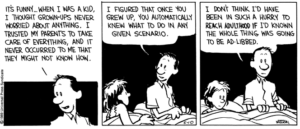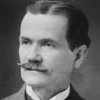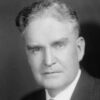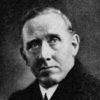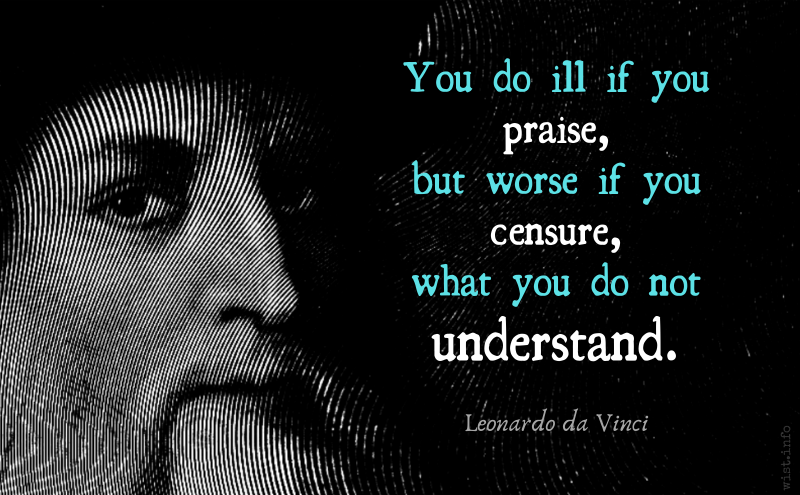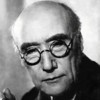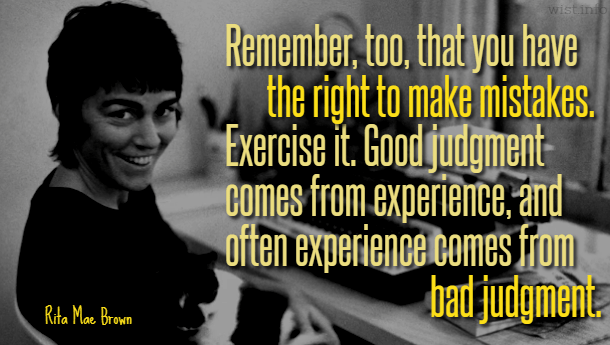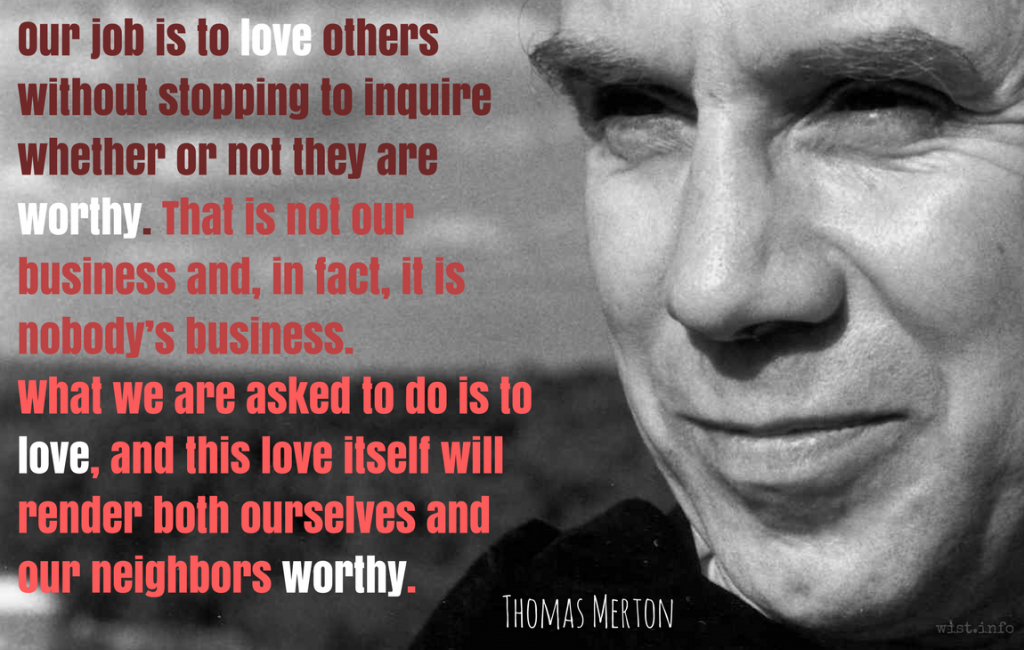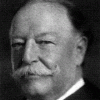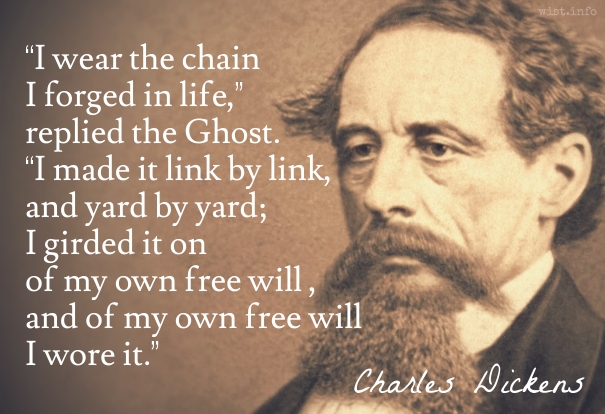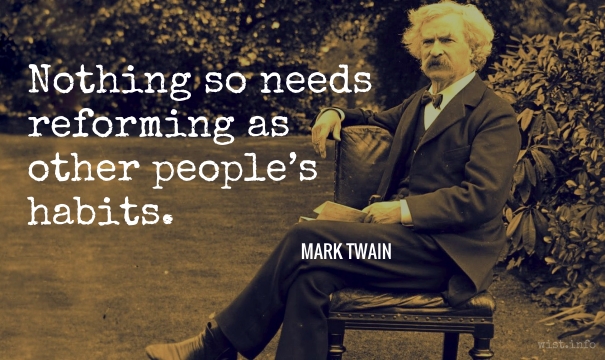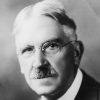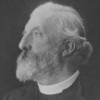People, in forming their opinions of others, are usually lazy enough to go by whatever is most obvious or whatever chance remark they happen to hear. So the best policy is to dictate to others the opinion you want them to have of you.
Judith Martin (b. 1938) American author, journalist, etiquette expert [a.k.a. Miss Manners]
Style and Substance: A Comedy of Manners, ch. 7 (1986)
(Source)
Quotations about:
judgment
Note not all quotations have been tagged, so Search may find additional quotes on this topic.
The marriage of convenience has this to recommend it: we are better judges of convenience than we are of love.
Mignon McLaughlin (1913-1983) American journalist and author
The Neurotic’s Notebook, ch. 1 (1963)
(Source)
A phool seems tew be a person who haz more will than judgment, and more vanity than either.
[A fool seems to be a person who has more will than judgment, and more vanity than either.]
Josh Billings (1818-1885) American humorist, aphorist [pseud. of Henry Wheeler Shaw]
Everybody’s Friend, Or; Josh Billing’s Encyclopedia and Proverbial Philosophy of Wit and Humor, ch. 155 “Affurisms: Ink Lings” (1874)
(Source)
Let Tom and Jane not think, because they see
one man is picking pockets and another
is offering all his goods to charity,
that they can judge their neighbors with God’s eyes:
for the pious man may fall, and the thief may rise.[Non creda donna Berta e ser Martino,
per vedere un furare, altro offerere,
vederli dentro al consiglio divino;
ché quel può surgere, e quel può cadere.]Dante Alighieri (1265-1321) Italian poet
The Divine Comedy [Divina Commedia], Book 3 “Paradiso,” Canto 13, l. 139ff (13.139-142) [Thomas Aquinas] (1320) [tr. Ciardi (1970)]
(Source)
Berta and Martino were common names in Dante's era, and stand in for "ordinary people" (with a sarcastic hint of pretension by giving them minor titles). Most translators use a straight translation of the names to Bertha and Martin; others change them to something more modern to reflect their everyman status.
(Source (Italian)). Alternate translations:The pious man
May fail ; the Penitent, altho' by spoil
He liv'd, may purchase Heav'n by arduous toil
Ere death: it is not our's their fate to scan.
[tr. Boyd (1802), st. 24]Seeing one steal,
Another bring, his offering to the priest,
Let not Dame Bertha and Sir Martin thence
Into heav’n’s counsels deem that they can pry:
For one of these may rise, the other fall.
[tr. Cary (1814)]Let not Nun Bertha and Saint Martin try,
Seeing one offer, and another steal,
The counsel of the heaven from that to tell:
For this may rise again, and that may fall.
[tr. Bannerman (1850)]Let not Dame Bertha nor Ser Martin think,
Seeing one steal, another offering make,
To see them in the arbitrament divine;
For one may rise, and fall the other may.
[tr. Longfellow (1867)]Let not Dame Bertha and Master Martin deem, for seeing one steal, another make offerings, that they are seeing them within the Divine counsel; for that one may be exalted and this may fall.
[tr. Butler (1885)]Let not Dame Bertha nor Sir Martin deem,
Because they see one rob, another pray,
That they can pry within the will supreme;
For one can rise, and one can fall away.
[tr. Minchin (1885)]Let not dame Bertha and master Martin, seeing one rob, and another make offering, believe to see them within the Divine counsel: for the one may rise and the other may fall.
[tr. Norton (1892)]Let not Dame Bertha or Squire Martin think, if they perceive one steal and one make offering, they therefore see them as in the divine counsel; for the one yet may rise and the other fall.
[tr. Wicksteed (1899)]Let not Dame Bertha and Master Martin, when they see one rob and another make an offering, think they see them within the divine counsel; for the one may rise and the other fall.
[tr. Sinclair (1939)]Let no Dame Bertha or Sir Martin deem,
Because they see one steal and one give all,
They see as divine forethought seéth them;
For the one yet may rise and the other fall.
[tr. Binyon (1943)]Let Jack and Jill not think they see so far
That, seeing this man pious, that a thief,
They see them such as in God's sight they are,
For one may rise, the other come to grief.
[tr. Sayers/Reynolds (1962)]Let not dame Bertha and squire Martin, if they see one steal and one make offering, believe to see them within the Divine Counsel: for the one may rise and the other may fall.
[tr. Singleton (1975)]Let not every Bertha and Martin think
Because they see one a thief, another respectable,
That they see how they are in the eyes of God;
For one may rise, and the other one may fall.
[tr. Sisson (1981)]Let not Dame Bertha or Master Martin think
that they have shared God’s Counsel when they see
one rob and see another who donates:
the last may fall, the other may be saved.
[tr. Mandelbaum (1984)]No Mr. or Miss Know-It-All should think,
when they see one man steal and one give alms
that they are seeing them through God's own eyes,
for one may yet rise up, the other fall.
[tr. Musa (1984)]Let not dame Bertha and messer Martin believe, because they see one stealing, another offering, that they see them within God’s counsel,
for that one can rise up, and this one can fall.
[tr. Durling (2011)]Do not let Jack and Jill think, that if they see someone steal or another make offering they therefore see them as Divine Wisdom does, since the one may still rise, and the other fall.
[tr. Kline (2002)]And so when Mrs Smith and Mr Jones
see one man steal, another offer alms,
don’t let them think they see this in God’s plan.
The thief may rise, the other take a fall.
[tr. Kirkpatrick (2007)]Let not Dame Bertha and Master Martin,
when they see one steal and another offer alms,
think that they behold them with God's wisdom,
for the first may still rise up, the other fall.
[tr. Hollander/Hollander (2007)]Let not Mrs. Judy and Mister John,
Seeing one man steal but another before
The altar with offerings, think one is sinful,
The other's in Heaven -- for people rise and fall.
[tr. Raffel (2010)]
Men should not be too smug in their own reason;
only a foolish man will walk his field
and count his ears too early in the season;
for I have seen a briar through winter’s snows
rattle its tough and menacing bare stems,
and then, in season, open its pale rose.
and I have seen a ship cross all the main,
true to its course and swift, and then go down
just as it entered its home port again.[Non sien le genti, ancor, troppo sicure
a giudicar, sì come quei che stima
le biade in campo pria che sien mature;
ch’i’ ho veduto tutto ’l verno prima
lo prun mostrarsi rigido e feroce,
poscia portar la rosa in su la cima;
e legno vidi già dritto e veloce
correr lo mar per tutto suo cammino,
perire al fine a l’intrar de la foce.]Dante Alighieri (1265-1321) Italian poet
The Divine Comedy [Divina Commedia], Book 3 “Paradiso,” Canto 13, l. 130ff (13.130-138) [Thomas Aquinas] (1320) [tr. Ciardi (1970)]
(Source)
(Source (Italian)). Alternate translations:Let none presume to fix his final state,
Or on such awful question hold debate;
Oft have I seen the vernal stem beguile
The reaper's hand: and oft the rigid thorn,
That to the blast of winter waves forlorn,
In June with rosy wreath is seen to smile.
Oft-times the bark that feuds with prosp'rous gale
Thro' the dividing waves with flowing sail.
Yet sinks in view of port, the pious man
May fail.
[tr. Boyd (1802), st. 23-24]Let not the people be too swift to judge,
As one who reckons on the blades in field,
Or ere the crop be ripe. For I have seen
The thorn frown rudely all the winter long
And after bear the rose upon its top;
And bark, that all the way across the sea
Ran straight and speedy, perish at the last,
E’en in the haven’s mouth.
[tr. Cary (1814)]Let not the people be too swift to judge,
Like one who looks upon the springing blade,
As if the harvest were already made.
For I have seen, the whole of winter long,
The thorn look rude and rough, and bare at top,
And after show the rose's reddening cup;
And seen the bark, already swift direct
Across the sea, in all its journey's way,
Perish at last when entering in the bay.
[tr. Bannerman (1850)]Nor yet shall people be too confident
In judging, even as he is who doth count
The corn in field or ever it be ripe.
For I have seen all winter long the thorn
First show itself intractable and fierce,
And after bear the rose upon its top;
And I have seen a ship direct and swift
Run o'er the sea throughout its course entire,
To perish at the harbour's mouth at last.
[tr. Longfellow (1867)]Let not the folk be yet too secure at judging, like him who values the corn in a field before it is ripe; for I have seen all winter long the plum-tree at first show itself rigid and stern, and afterward bear blossoms on its top ; and I saw on a time a craft trim and swift to sail the sea for its whole course, perish at the last in the entering of the sound.
[tr. Butler (1885)]Let not the people think themselves elected
To judge like one who counteth on the corn
Within his field ere it be ripe.
Dejected I have beheld through winter time a thorn
Its rude repelling aspect show, and bear
After a rose, upon its top forlorn.
And I have seen a vessel swiftly steer
Through all its voyage across the ocean stream.
Perish at last, the harbour's entrance near.
[tr. Minchin (1885)]Let not the people still be too secure in judgment, like him who reckons up the blades in the field ere they are ripe. For I have seen the briar first show itself stiff and wild all winter long, then bear the rose upon its top. And I have seen a bark ere now ran straight and swift across the sea through all its course, to perish at last at entrance of the harbor.
[tr. Norton (1892)]Let not folk yet be too secure in judgment, as who should count the ears upon the field ere they be ripe;
for I have seen first all the winter through the thorn display itself hard and forbidding and then upon its summit bear the rose;
and I have seen ere now a ship fare straight and swift over the sea through her entire course, and perish at the last, entering the harbour mouth.
[tr. Wicksteed (1899)]So also let not the people be too sure in judging, like those that reckon the corn in the field before it is ripe. For I have seen the briar first show harsh and rigid all through the winter and later bear the rose upon its top, and once I saw a ship that ran straight and swift over the sea through all its course perish at the last entering the harbour.
[tr. Sinclair (1939)]Let not the people be too self-assured
In judging early, as who should count the rows
Of green blades in the field ere they matured.
For I have seen how first the wild-brier shows
Her sprays, all winter through, thorny and stark,
And then upon the topmost bears the rose;
And I have seen ere now a speeding barque
Run all her sea-course with unswerving stem
And close on harbour go down to the dark.
[tr. Binyon (1943)]No one should ever be too self-assured
In judgement, like a farmer reckoning
His gains before the corn-crop is matured,
For I have seen the briar, a prickly thing
And tough the winter through, and on its tip
Bearing the very rose at close of spring;
And once I saw, her whole long ocean trip
Safe-done, a vessel wrecked upon the bar,
And down she went, that swift and stately ship.
[tr. Sayers/Reynolds (1962)]Moreover, let not folk be too secure in judgment, like one who should count the ears in the field before they are ripe; for I have seen first, all winter through, the thorn display itself hard and stiff, and then upon its summit bear the rose. And I have seen ere now a ship fare straight and swift over the sea through all her course, and perish at the last as she entered the harbor.
[tr. Singleton (1975)]Let people not be too sure of themselves
And their judgement, like someone who reckons
The field of corn before the ears are ripe:
For I have seen all the winter through
The thorn first show itself unyielding, wild,
And after all carry a rose on top;
And I have seen a ship sail straight and swiftly
Over the sea for the whole of its voyage
Yet perish at last at the harbour mouth.
[tr. Sisson (1981)]So too, let men not be too confident
in judging -- witness those who, in the field,
would count the ears before the corn is ripe;
for I have seen, all winter through, the brier
display itself a stiff and obstinate,
and later, on its summit, bear the rose;
and once I saw a ship sail straight and swift
through all its voyaging across the sea,
then perish at the end, at harbor entry.
[tr. Mandelbaum (1984)]Nor should one be too quick to trust his judgment;
be not like him who walks his field and counts
the ears of corn before the time is ripe,
for I have seen brier all winter long
showing its rough and prickly stem, and then
eventually produce a lovely rose,
and I have seen a ship sail straight and swift
over the sea through all its course, and then
about to enter in the harbor, sink.
[tr. Musa (1984)]And let not people be too sure to judge, like one who appraises the oats in the field before they are ripe:
for I have seen all the previous winter long the thornbush appear rigid and and fierce, but later bear the rose upon its tip,
and I have seen a ship run straight and swift across the sea for all in its course, only to perish at last when entering the port.
[tr. Durling (2011)]Do not let people be too secure in their judgements, like those who count the ears of corn in the field before the crop ripens, since I have seen, all winter long, the thorn display itself, sharp and forbidding, and then on its summit bear the rose; and before now I have seen a ship run straight and sure over the sea for her entire course, and sink in the end, entering the harbour mouth.
[tr. Kline (2002)]And then again, don't let folk be too sure
in passing judgement as do those who price
the harvest in the field before it's ripe.
For I have seen, at first, all winter through
a thorn bush shows itself as stark and fierce,
which after bears a rose upon its height.
And I have seen a keel, steered swift and well,
speed over oceans all its voyage through,
then perish at the entrance to the dock.
[tr. Kirkpatrick (2007)]Let the people, then, not be too certain
in their judgments, like those that harvest in their minds
corn still in the field before it ripens.
For I have seen the briar first look dry and thorny
right through all the winter's cold,
then later wear the bloom of roses at its tip,
and once I saw a ship, which had sailed straight
and swift upon the sea through all its voyage,
sinking at the end as it made its way to port.
[tr. Hollander/Hollander (2007)]But ordinary people, too, must guard
Their judgment, not like those who count up ears
Of corn before the field is ripe. For I
Have seen, all winter through, bushes of thorn
Covered with small but savage knives, hard
And fierce, but now comes summer, and they they're roses
All over. And I have seen a ship sail far,
Straight and swift, and on course, but once in the harbor
Down she goes, sinking like a stone.
[tr. Raffel (2010)]
And lead weights to your feet may my words be,
that you move slowly, like a weary man,
to the ‘yes’ and ‘no’ of what you do not see.
For he is a fool, and low among his kind,
who answers yea or nay without reflection,
nor does it matter on which road he runs blind.
Opinions too soon formed often deflect
man’s thinking from the truth into gross error,
in which his pride then binds his intellect.
[E questo ti sia sempre piombo a’ piedi,
per farti mover lento com’ uom lasso
e al sì e al no che tu non vedi:
ché quelli è tra li stolti bene a basso,
che sanza distinzione afferma e nega
ne l’un così come ne l’altro passo;
perch’ elli ’ncontra che più volte piega
l’oppinïon corrente in falsa parte,
e poi l’affetto l’intelletto lega.]Dante Alighieri (1265-1321) Italian poet
The Divine Comedy [Divina Commedia], Book 3 “Paradiso,” Canto 13, l. 112ff (13.112-121) [Thomas Aquinas] (1320) [tr. Ciardi (1970)]
(Source)
(Source (Italian)). Alternate translations:Now learn, my Son,
With tardy foot to make your Judgment run,:
And Fancy's wild excursions to repel
Unhappy they, who, by her lure betray'd.
And, like 'lorn travellers, by meteors led.
Their affirmation or denial give
Unweigh'd, for Fancy leans to Falsehood's part,
And soon to Passion's rule betrays the heart.
And her embruted Slaves in bondage live.
[tr. Boyd (1802), st. 19-20]And let this
Henceforth be led unto thy feet, to make
Thee slow in motion, as a weary man,
Both to the ‘yea’ and to the ‘nay’ thou seest not.
For he among the fools is down full low,
Whose affirmation, or denial, is
Without distinction, in each case alike
Since it befalls, that in most instances
Current opinion leads to false: and then
Affection bends the judgment to her ply.
[tr. Cary (1814)]Let this henceforth be lead unto thy feet,
To make thee move slow, like a weary man,
Both to the Yea and Nay, as far 's you can:
For he among the fools is low enough,
Without distinction, who affirms, denies,
Where one and where the other question lies.
It happens, too, that oftentimes incline
Opinions current to the falser side,
And intellect is by affection tied.
[tr. Bannerman (1850)]And lead shall this be always to thy feet,
To make thee, like a weary man, move slowly
Both to the Yes and No thou seest not;
For very low among the fools is he
Who affirms without distinction, or denies,
As well in one as in the other case;
Because it happens that full often bends
Current opinion in the false direction,
And then the feelings bind the intellect.
[tr. Longfellow (1867)]And let this be always as lead to thy feet, to make thee move slow as a weary man both to the yes and to the no that thou seest not; for he is very low down among the fools who affirms or denies without distinction, in the one no less than in the other pass: since it occurs that oftentimes the current opinion swerves in a false direction, and afterwards the desire binds the understanding.
[tr. Butler (1885)]And let this to thy feet a dead weight be,
Like one fatigued to make thee journey slow
Towards the Yes, or No, thou dost not see.
For he amongst the fools is very low,
Who without thought affirmeth, or denies,
Whether to one or other step he go;
Because it happens that too often flies
Public opinion into error's part.
And then its influence the intellect ties.
[tr. Minchin (1885)]And let this be ever as lead to thy feet, to make thee move slow as a weary man, both to the YES and to the NO which thou seest not; for he is very low among the fools who affirms or denies without distinction, alike in the one and in the other case: because it happens, that oftentimes the current opinion bends in false direction, and then the inclination binds the understanding.
[tr. Norton (1892)]And let this ever be lead to thy feet, to make The thee move slow, like a weary man ; both to the yea and nay thou seest not;
for he is right low down amongst the fools who maketh affirmation or negation without distinction between case and case;
wherefore it chanceth many times swift-formed rash opinion leaneth the wrong way, and then con-ceit bindeth the intellect.
[tr. Wicksteed (1899)]And let this always be lead on thy feet to make thee slow, like a weary man, in moving either to the yea or the nay where thou dost not see clearly; for he ranks very low among the fools, in the one case as in the other, who affirms or denies without distinguishing, since it often happens that a hasty opinion inclines to the wrong side and then the feelings bind the intellect.
[tr. Sinclair (1939)]Ever let this, like lead, thy feed down-weigh
To make thee, where thou see'st not clear, move slow,
Like one who is weary, both to Yea and Nay.
For he among the foolish stands right low
Who affirms without distinction or denies
With whichsoever case he hast o do;
Since often it haps that rashness of surmise
Leadeth the judgment on false roads to start;
Then fond desire the understanding ties.
[tr. Binyon (1943)]And to thy feet be this hobble, wrought
Of lead, to make thee move at sluggard pace
Toward Yea and Nay where thou perceivest naught,
For low among the dunces is his place
Who hastes to accept or reject
With no distinction made 'twixt case and case;
Thence come rash judgements, mostly incorrect
And prejudiced, and stubborn all the more
That self-conceit shackles the intellect.
[tr. Sayers/Reynolds (1962)]And let this ever be as lead to your feet, to make you slow, like a weary man, in moving either to the yes or the no which you see not; for he is right low down among the fools, alike in the one asnd in the other case, who affirms or denies without distinguishing; because it happens that oftentimes hasty opinion inclines to the wrong side, and then fondness for it binds the intellect.
[tr. Singleton (1975)]And let this always make your feet like lead
So that you move like a man who is worn out
Towards a Yes or No you cannot actually see:
For a man is right down among the fools
In the case either of affirmation or denial,
If he proceeds without making distinctions;
Because it often happens that a quick opinion
Inclines int he wrong direction, and after that
The intellect is hampered by vanity.
[tr. Sisson (1981)]And let this weigh as lead to slow your steps,
to make you move as would a weary man
to yes or no when you do not see clearly:
whether he would affirm or would deny,
he who decides without distinguishing
must be among the most obtuse of men;
opinion -- hasty -- often can incline
to the wrong side, and then affection for
one’s own opinion binds, confines the mind.
[tr. Mandelbaum (1984)]Let this be leaden weight upon your feet
to make you move slow as a weary man
both to the ‘yes’ or ‘no’ you do not see,
for he ranks low, indeed, among the fools,
who rushes to affirm or to deny,
no matter which, without distinguishing.
Opinions formed in haste will oftentimes
lead in a wrong direction, and man’s pride
then intervenes to bind his intellect.
[tr. Musa (1984)]And let this ever be lead upon your feet, to make you move slowly, like a weary man, to both the yes and the no that you do not see:
for surely he is low among the fools who affirms and denies without distinction in either case,
for it often happens that a hasty opinion turns in a wrong direction, and then affect binds the intellect.
[tr. Durling (2011)]And let this always weight your feet down with lead, and make you go slowly, like a tired man, approaching the yes or no you do not grasp, since he is truly down there among the fools, who affirms or denies without distinguishing between cases, so that it often happens that a quick opinion leans to the wrong side, and then Pride entangles the intellect.
[tr. Kline (2002)]And let this be a lead weight on your feet,
so that you move as slow as if worn out
to any “yes” or “no” unclear to you.
For no fool is as low a fool as one
who taking either of these steps will fail
affirming to denying in distinction.
So often when our judgement rushes on
it happens that we veer in false directions
and then emotions bind tie intellect.
[tr. Kirkpatrick (2007)]And let this always be as lead upon your feet
to make you slow, just like a weary man, in moving,
whether to yes or no, unless you see both clearly.
For he ranks low among the fools
who, without making clear distinctions,
affirms or denies in one case or another,
since it often happens that a hasty opinion
inclines one to the erring side, and then
fondness for it fetters the working of the mind.
[tr. Hollander/Hollander (2007)]And let this forever be like lead on your feet,
Forcing you to go slowly, like someone weary,
Saying 'yes' or 'no' when neither is clear.
A man who either concurs or disagrees
Without some plain distinctions is a fallen fool,
And pretty low even at that level,
For hasty judgment often bends to what's wrong,
And having made a foolish choice the fool
Holds on, letting his foolery tie up his mind.
[tr. Raffel (2010)]
The true rule, in determining to embrace, or reject any thing, is not whether it have any evil in it; but whether it have more of evil, than of good. There are few things wholly evil, or wholly good. Almost every thing, especially of governmental policy, is an inseparable compound of the two; so that our best judgment of the preponderance between them is continually demanded.
Abraham Lincoln (1809-1865) American lawyer, politician, US President (1861-65)
Speech (1848-06-20), On Internal Improvements, US House of Representatives
(Source)
But so long as men are not trained to withhold judgment in the absence of evidence, they will be led astray by cocksure prophets, and it is likely that their leaders will be either ignorant fanatics or dishonest charlatans. To endure uncertainty is difficult, but so are most of the other virtues. For the learning of every virtue there is an appropriate discipline, and for the learning of suspended judgment the best discipline is philosophy.
Bertrand Russell (1872-1970) English mathematician and philosopher
“Philosophy for Laymen,” Universities Quarterly (1946-11)
(Source)
Reprinted in Unpopular Essays, ch. 2 (1951).
CALVIN’S DAD: It’s funny … when I was a kid, I thought grown-ups never worried about anything. I trusted my parents to take care of everything, and it never occurred to me that they might not know how. I figured that once you grew up, you automatically knew what to do in any given scenario. I don’t think I would have been in such a hurry to reach adulthood if I’d know the whole thing was going to be ad-libbed.
Bill Watterson (b. 1958) American cartoonist
Calvin and Hobbes (1989-05-10)
(Source)
After their house has been burgled.
A shrewd man has to arrange his interests in order of importance and deal with them one by one; but often our greed upsets this order and makes us run after so many things at once that through over-anxiety to have the trivial we miss the most important.
[Un habile homme doit régler le rang de ses intérêts et les conduire chacun dans son ordre. Notre avidité le trouble souvent en nous faisant courir à tant de choses à la fois que, pour désirer trop les moins importantes, on manque les plus considérables.]
François VI, duc de La Rochefoucauld (1613-1680) French epigrammatist, memoirist, noble
Réflexions ou sentences et maximes morales [Reflections; or Sentences and Moral Maxims], ¶66 (1665-1678) [tr. Tancock (1959)]
(Source)
Present in the first, 1665 edition in a slightly longer form:Un habile homme doit savoir régler le rang de ses intérêts et les conduire chacun dans son ordre. Notre avidité le trouble souvent en nous faisant courir à tant de choses à la fois que, pour désirer trop les moins importantes, nous ne les faisons pas assez servir à obtenir les plus considérables.
(Source (French)). Alternate translations:In this the prudent man is distinguishable from the imprudent, that he regulates his interests, and directs them to the prosecution of his designs each in their order. Our earnestness does many times raise a disturbance in them, by hurrying us after a hundred things at once. Thence it proceeds, that out of an excessive desire of the less important, we do not what is requisite for the attainment of the most considerable.
[tr. Davies (1669), ¶165]A wise Man should order his Designs, and set all his Interests in their proper places. This Order is often disturbed by a foolish greediness, which, while it puts us upon pursuing several things at once, makes us eager for matters of less consideration; and while we grasp at trifles, we let go things of greater Value.
[tr. Stanhope (1694), ¶67]An able man will arrange his interests, and conduct each in its proper order. Our greediness often hurts us, by making us prosecute so many things at once; by too earnestly desiring the less considerable, we lose the more important.
[pub. Donaldson (1783), ¶205; ed. Lepoittevin-Lacroix (1797), ¶65]An able man will arrange his respective interests;, and conduct each in its proper order. Ambition is often injurious, by tempting us to prosecute too much at once. By earnestly desiring the less considerable, we lose the more important.
[ed. Carville (1835), ¶473]A clever man should regulate his interests, and place them in proper order. Our avidity often deranges them by inducing us to undertake too many things at once; and by grasping at minor objects, we lose our hold of more important ones.
[ed. Gowens (1851), ¶67]A clever man ought to so regulate his interests that each will fall in due order. Our greediness so often troubles us, making us run after so many things at the same time, that while we too eagerly look after the least we miss the greatest.
[tr. Bund/Friswell (1871)]A wise man co-ordinates his interests, and develops them according to their merits. Cupidity defeats its own ends by following so many at once that in our greed for trifles we lose sight of important matters.
[tr. Heard (1917)]A clever man will know how to range his interests, and will pursue each according to its merits. Our greed, however, will often confuse our method; for we run after so many things at once that we frequently miss what is of importance in pursuit of what is negligible.
[tr. FitzGibbon (1957)]Clever men should arrange their desires in the proper order and seek each in turn. In our eagerness we often attempt too many things at once, and by striving too much after the small ones we lose the big.
[tr. Kronenberger (1959)]A wise man ought to arrange his interests in their true order of importance. Our greed often disturbs this order by making us pursue so many things at once that, for too much desiring the least important, we miss those that are most so.
[tr. Whichello (2016)]
When one admits that nothing is certain one must, I think, also admit that some things are much more nearly certain than others. It is much more nearly certain that we are assembled here tonight than it is that this or that political party is in the right. Certainly there are degrees of certainty, and one should be very careful to emphasize that fact, because otherwise one is landed in an utter skepticism, and complete skepticism would, of course, be totally barren and completely useless.
Bertrand Russell (1872-1970) English mathematician and philosopher
“Am I an Atheist or an Agnostic?” sec. “Skepticism” (1949)
(Source)
Originally given as a speech, "Agnosticism v. Atheism," Rationalist Press Assoc. Annual Dinner, London (1949-05-20); then printed as "Agnosticism v. Atheism," The Literary Guide and Rationalist Review (1949-07); then released as an essay under this title later in 1949.
It is particularly incumbent on those who never change their opinion, to be secure of judging properly at first.
We are firm believers in the maxim that for all right judgment of any man or thing it is useful, nay, essential, to see his good qualities before pronouncing on his bad.
Thomas Carlyle (1795-1881) Scottish essayist and historian
“Goethe,” Foreign Review No. 3 (1828-08)
(Source)
Reviewing Goethe's Sämmtliche Werke, Vollständige Ausgabe Letzter Hand (1827). Reprinted in Carlyle, Critical and Miscellaneous Essays (1845).
The awareness of the ambiguity of one’s highest achievements (as well as one’s deepest failures) is a definite symptom of maturity.
Paul Tillich (1886-1965) American theologian and philosopher
Quoted in Time (1963-05-17)
(Source)
Speech given at the 40th Anniversary Dinner for Time, reported in the following week's magazine.
It is the certainty that they possess the truth that makes men cruel.
[C’est la certitude qu’ils tiennent la vérité qui rend les hommes cruels.]
Anatole France (1844-1924) French poet, journalist, novelist, Nobel Laureate [pseud. of Jaques-Anatole-François Thibault]
(Misquotation)
Widely attributed (in French and English) to Anatole France, but not found in his works, including the one location it is sometimes cited from, Les Dieux Ont Soif [The Gods Are Thirsty, The Gods Are Athirst, The Gods Will Have Blood] (1912), in either English translation or, more importantly, in the original French.
While thematically keeping in the novel's depiction of the French Revolution and the Terror, the closest match to the quote I can find is this portion of ch. 22, talking about the expediting of the trials of those charged with counter-revolutionary crimes, eliminating the need to prove a misdeed by simply inquiring as to the accused's beliefs.Justice thus abbreviated satisfied them; the pace was quickened, and no obstacles were left to fret them. They limited themselves to an inquiry into the opinions of the accused, not conceiving it possible that anyone could think differently from themselves except in pure perversity. Believing themselves the exclusive possessors of truth, wisdom, the quintessence of good, they attributed to their opponents noting but error and evil. They felt themselves all-powerful; they envisaged God.
[tr. Allinson (1913), Jackson (1921)]Justice, thus curtailed, satisfied them; the pace was quickened and no obstacles were left to confuse them. They confined themselves to inquiring into the opinions of the accused, not conceiving it possible that anyone, except from pure perversity, could think differently from themselves. Believing themselves to possess a monopoly of truth, wisdom and goodness, they attributed to their opponents all error, stupidity and evil. They felt themselves omnipotent: their eyes had seen God.
[tr. Davies (1979)]La justice abrégée les contentait. Rien, dans sa marche accélérée, ne les troublait plus. Ils s’enquéraient seulement des opinions des accusés, ne concevant pas qu’on pût sans méchanceté penser autrement qu’eux. Comme ils croyaient posséder la vérité, la sagesse, le souverain bien, ils attribuaient à leurs adversaires l’erreur et le mal. Ils se sentaient forts : ils voyaient Dieu.
[Original]
There’s many a slip betwixt the observation and the conclusion.
Austin O'Malley (1858-1932) American ophthalmologist, professor of literature, aphorist
Keystones of Thought (1914)
(Source)
My son, young men’s arms are indeed taut for action, but old men’s counsels are better; for time teaches the most subtle lessons.
Euripides (485?-406? BC) Greek tragic dramatist
Bellerophon [Βελλεροφῶν], frag. 291 (TGF) (c. 430 BC) [tr. Collard, Hargreaves, Cropp (1995)]
(Source)
Alternate translation:Son, the hands of young men always itch for action, but the
judgment of the old is sounder.
Time teaches discrimination
[tr. Stevens (2012)]
The course of a man’s life is certain. The path that we follow goes in only one direction. Every mile is distinctly marked with its own peculiar characteristic — the vulnerability of infants, the animal high spirits of adolescents, the seriousness of adults, the maturity of old men — and at each of these stages we must accept gracefully what Nature grants us.
[Cursus est certus aetatis et una via naturae eaque simplex, suaque cuique parti aetatis tempestivitas est data, ut et infirmitas puerorum et ferocitas iuvenum et gravitas iam constantis aetatis et senectutis maturitas naturale quiddam habet, quod suo tempore percipi debeat.]
Marcus Tullius Cicero (106-43 BC) Roman orator, statesman, philosopher
De Senectute [Cato Maior; On Old Age], ch. 10 / sec. 33 (10.33) (44 BC) [tr. Cobbold (2012)]
(Source)
(Source (Latin)). Alternate translations:The cours and the weye of age is certeyne and determyned by nature, whiche hathe onely awey which is symple & is nothyng different more in the one than in the othir. But each go by that symple and determyned wey aftir the degrees in their cours from the one age in to that other. And yet nature had given to every part of age his owne propre season and tyme, and hir pertynent cours of usage in kynde. That is to witt, that sekenesse and maladye is appropryd to the age of puerice in childhode, & cruelte is appropryd to the age of yongth, worshipfulnesse and sadnesse of maners be appropryd to the age of virilite whiche is the fyfthe age. Moderaunce and temperaunce be appropryd to olde age. Eueriche oweth to have sumwhat naturelly and appropryd unto that whiche may be gadird in his tyme.
[tr. Worcester/Worcester/Scrope (1481), Part 3]The race and course of age is certain; and there is but one way of nature and the same simple; and to every part of a man's life and age are given his convenient times and proper tempestivities. For even as weakness and infirmity is incident to young children, lustiness and bravery to young men, and gravity when they come to ripe years; so, likewise the maturity or ripeness of old age have a certain special gift given and attributed to it by nature, which ought not to be neglected, but to be taken in his own time and season when it cometh.
[tr. Newton (1569)]There is but one course of age, and one way of nature, and the same simple, and to every part of age its own timelines is given; for as infirmity belongs to child-hood, fiercenesse to youth, and gravity to age, so the true ripenesse of age hath a certaine natural gravity in it, which ought to be used in it own time.
[tr. Austin (1648)]Simple, and certain Nature's wayes appear,
As she sets forth the seasons of the year.
So in all parts of life we find her truth,
Weakness to childhood, rashness to our youth:
To elder years to be discreet and grave,
Then to old age maturity she gave.
[tr. Denham (1669)]Every Age has something in it, peculiar to it self: as Weakness to our Infancy, an unguided Warmth to Youth, Seriousness to Manhood, and a certain Maturity of Judgment to Old Age, which we may expect to reap the Fruits of, when advanced to it.
[tr. Hemming (1716)]Life has a sure Course, and Nature but one Way, that that too simple and plain. And to every Part of Man's Age a peculiar Propriety of Temper is given: Thus Weakness in Children, a Boldness in Youth, and a Gravity in Manhood appears; and a full Ripeness of Years has always something which seems natural to it, and which ought to be made use of at a proper Time.
[tr. J. D. (1744)]The Stages of Life are fixed; Nature is the same in all, and goes on in a plain and steady Course: Every Part of Life, like the Year, has its peculiar Season: As Children are by Nature weak, Youth is rash and bold; staid Manhood more solid and grave; and so Old-Age in its Maturity, has something natural to itself, that ought particularly to recommend it.
[tr. Logan (1750)]Nature conducts us, by a regular and insensible progression through the different seasons of human life; to each of which she has annexed its proper and distinguishing characteristic. As imbecility is the attribute of infancy, ardour of youth, and gravity of manhood; so declining age has its essential properties, which gradually disclose themselves as years increase.
[tr. Melmoth (1773)]The course of life is fixed, and the path of nature is one, and that simple. And its own proper seasonableness has been given to each division of life; so that both the feebleness of boys and the proud spirit of young men, and the gravity of a now settle period of life, and the maturity of old age, has something natural to it, which ought to be gathered in its own season.
[Cornish Bros. ed. (1847)]There is a definite career in life, and one way of nature, and that a simple one; and to every part ot life its own peculiar period has been assigned: so that both the feebleness of boys, and the high spirit of young men, and the steadiness of now fixed manhood, and the maturity of old age, have something natural, which ought to be enjoyed in their own time.
[tr. Edmonds (1874)]Life has its fixed course, and nature one unvarying way; each age has assigned to it what best suits it, so that the fickleness of boyhood, the sanguine temper of youth, the soberness of riper years, and the maturity of old age, equally have something in harmony with nature, which ought to be made availing in its season.
[tr. Peabody (1884)]The course of life is fixed, and nature admits of its being run but in one way, and only once; and to each part of our life there is something specially seasonable; so that the feebleness of children, as well as the high spirit of youth, the soberness of maturer years, and the ripe wisdom of old age -- all have a certain natural advantage which should be secured in its proper season.
[tr. Shuckburgh (1895)]One only way
Nature pursues, and that a simple one:
To each is given what is fit for him.
The boy is weak: youth is more full of fire:
Increasing years have more of soberness:
And as in age there is a ripeness too.
Each should be garnered at its proper time,
And made the most of.
[tr. Allison (1916)]Life's race-course is fixed; Nature has only a single path and that path is run but once, and to each stage of existence has been allotted its own appropriate quality; so that the weakness of childhood, the impetuosity of youth, the seriousness of middle life, the maturity of old age -- each bears some of Nature's fruit, which must be garnered in its own season.
[tr. Falconer (1923)]The course of life is clear to see; nature has only one path, and it has no turnings. Each season of life has an advantage peculiarly its own; the innocence of children, the hot blood of youth, the gravity of the prime of life, and the mellowness of age all possess advantages that are theirs by nature, and that should be garnered each at its proper time.
[tr. Copley (1967)]Life and nature have but one direction
Easy to take, without correction.
Each of life’s rite of passage dates
Has its own distinguishing traits:
A child’s weakness
A youth’s boldness
An adult’s authority
An old man’s maturity
And each with a certain natural zest
To be reaped when it’s time for its harvest.
[tr. Bozzi (2015)]The course of life cannot change. Nature has but a single path and you travel it only once. Each stage of life has its own appropriate qualities -- weakness in childhood, boldness in youth, seriousness in middle age, and maturity in old age. These are fruits that must be harvested in due season.
[tr. Freeman (2016)]
Narrow-mindedness: allowing one’s prejudices to become convictions.
Marcelene Cox (1900-1998) American writer, columnist, aphorist
“Ask Any Woman” column, Ladies’ Home Journal (1944-06)
(Source)
It may be prudent in me to act sometimes by other men’s reason; but I can think only by my own.
Education is more than information, or skill, or propaganda. In each age education must take into account the conditions of that age. But the educated mind is not a mere creature of its own time. Education is emancipation from herd opinion, self-mastery, capacity for self-criticism, suspended judgment, and urbanity.
Everett Dean Martin (1880-1941) American educator, minister, writer, lecturer
The Meaning of a Liberal Education, Preface (1926)
(Source)
I have often wondered, that persons who make a boast of professing the Christian religion, namely, love, joy, peace, temperance, and charity to all men, should quarrel with such rancorous animosity, and display daily towards one another such bitter hatred, that this, rather than the virtues they claim, is the readiest criterion of their faith.
Baruch Spinoza (1632-1677) Dutch philosopher
Theological-Political Treatise [Tractatus Theologico-Politicus], Part 1, Preface, sec. 23 (1670)
(Source)
Our Constitution assumes that the common sense of the people and their attachment to our country will enable them, after free discussion, to withstand ideas that are wrong. To say that our patriotism must be protected against false ideas by means other than these is, I think, to make a baseless charge. Unless we can rely on these qualities—if, in short, we begin to punish speech — we cannot honestly proclaim ourselves to be a free Nation and we have lost what the Founders of this land risked their lives and their sacred honor to defend.
Hugo Black (1886-1971) American politician and jurist, US Supreme Court Justice (1937-71)
Barenblatt v. United States, 360 U.S. 109, 146 (1959) [dissent]
(Source)
Whether the particular revelation which you suppose to have been made to yourself were real or imaginary, your reason alone is the competent judge. For, dispute as long as we will on religious tenets, our reason at last must ultimately decide, as it is the only oracle which God has given us to determine between what really comes from him, & the phantasms of a disordered or deluded imagination.
Thomas Jefferson (1743-1826) American political philosopher, polymath, statesman, US President (1801-09)
Letter to Miles King (26 Sep 1814)
(Source)
The usual devastating put-downs imply that a person is basically bad, rather than that he is a person who sometimes does bad things. Obviously, there is a vast difference between a “bad” person and a person who does something bad.
Hilary Hinton "Zig" Ziglar (1926-2012) American author, salesperson, motivational speaker
See You at the Top, Segment 2, ch. 2 “Causes of a Poor Self Image” (1974)
(Source)
Every fool stands convinced; and everyone convinced is a fool; and the faultier a man’s judgment, the firmer his conviction.
[Todo necio es persuadido, y todo persuadido necio; y quanto mas erroneo su dictamen, es mayor su tenacidad.]
Baltasar Gracián y Morales (1601-1658) Spanish Jesuit priest, writer, philosopher
The Art of Worldly Wisdom [Oráculo Manual y Arte de Prudencia], § 183 (1647) [tr. Fischer (1937)]
(Source)
(Source (Spanish)). Alternate translation:All Fools are Opiniatours, and all Opiniatours are Fools. The more Erroneous their Opinions are, the more they hug them.
[Flesher ed. (1685)]Every fool is fully convinced, and every one fully persuaded is a fool: the more erroneous his judgment the more firmly he holds it.
[tr. Jacobs (1892)]Fools are stubborn, and the stubborn are fools, and the more erroneous their judgment is, the more they hold onto it.
[tr. Maurer (1992)]
Thinking is difficult, therefore let the herd pronounce judgment!
Carl Jung (1875-1961) Swiss psychologist
Flying Saucers: A Modern Myth of Things Seen in the Skies, ch. 2 (1959) [tr. Hull]
(Source)
The motto of the "relatively unconscious man" who "clings to the commonplace, the obvious, the probable, the collectively valid." Reprinted in the The Collected Works of C.G. Jung - Civilization in Transition, vol. 10, ¶ 653.
Probable source of the frequently-attributed (but unfound) "Thinking is difficult. That's why most people judge."
Fortunate are those who recognize the divine importance of youth’s cocksureness and conceit, and yet know how, gently and appreciatively, to temper it with the riper judgment of added years.
Bruce Barton (1886-1967) American author, advertising executive, politician
More Power to You, ch. 27 (1917)
(Source)
To arrive at a just estimate of a renowned man’s character one must judge it by the standards of his time, not ours. Judged by the standards of one century, the noblest characters of an earlier one lose much of their luster; judged by the standards of today, there is probably no illustrious man of four or five centuries ago whose character could meet the test at all points.
Mark Twain (1835-1910) American writer [pseud. of Samuel Clemens]
Joan of Arc, “Translator’s Preface” (1860)
(Source)
One day you are an apprentice and everybody’s pet; the next you are coldly expected to deliver. There is never sufficient warning that the second day is coming.
Mignon McLaughlin (1913-1983) American journalist and author
The Neurotic’s Notebook, ch. 10 (1963)
(Source)
Acts and their consequences are the things by which our fellows judge us. Anything else, and all that you get is a cheap feeling of moral superiority by thinking how you would have done something nicer if it had been you. So as for the rest, leave it to heaven. I’m not qualified.
In discussion it is not so much weight of authority as force of argument that should be demanded. Indeed the authority of those who profess to teach is often a positive hindrance to those who wish to learn; they cease to employ their own judgment, and take what they perceive to be the verdict of their chosen master as settling the question.
[Non enim tam auctoritatis in disputando quam rationis momenta quaerenda sunt. Quin etiam obest plerumque iis qui discere volunt auctoritas eorum qui se docere profitentur; desinunt enim suum iudicium adhibere, id habent ratum quod ab eo quem probant iudicatum vident.]
Marcus Tullius Cicero (106-43 BC) Roman orator, statesman, philosopher
De Natura Deorum [On the Nature of the Gods], Book 1, ch. 5 / sec. 10 (1.10) (45 BC) [tr. Rackham (1933)]
(Source)
(Source (Latin)). Alternate translation:For the force of reason in disputation is to be sought after rather than authority, since the authority of the teacher is often a disadvantage to those who are willing to learn; as they refuse to use their own judgment, and rely implicitly on him whom they make choice of for a preceptor.
[tr. Yonge (1877)]In discussion it is not so much authorities as determining reasons that should be looked for. In fact the authority of those who stand forward as teachers is generally an obstacle in the way of those who wish to learn, for the latter cease to apply their own judgment, and take for granted the conclusions which they find arrived at by the teacher whom they approve.
[tr. Brooks (1896)]For when we engage in argument we must look to the weight of reason rather than authority. Indeed, students who are keen to learn often find the authority of those who claim to be teachers to be an obstacle, for they cease to apply their own judgement and regard as definitive the solution offered by the mentor of whom they approve.
[tr. Walsh (2008)]
Reader and hearer, Aulus, love my stuff;
A certain poet says it’s rather rough.
Well, I don’t care. For dinners or for books
The guest’s opinion matters, not the cook’s.[Lector et auditor nostros probat, Aule, libellos,
Sed quidam exactos esse poeta negat.
Non nimium curo: nam cenae fercula nostrae
Malim convivis quam placuisse cocis.]Martial (AD c.39-c.103) Spanish Roman poet, satirist, epigrammatist [Marcus Valerius Martialis]
Epigrams [Epigrammata], Book 9, epigram 81 (9.81) (AD 94) [tr. Francis & Tatum (1924)]
(Source)
"To Aulus". The numbering for this epigram varies between 81, 82, and 83 within in Book 9. (Source (Latin)). Alternate translations:The readers and the hearers like my books,
And, yet, some writers cannot them digest:
But what care I? for when I make a feast,
I would my guests should praise it, not the cooks.
[tr. Harington (16th C)]Readers and hearers, both my Bookes renowne;
Some Poets say th' are not exactly done.
I care not much; like banquets, let my Bookes
Rather be pleasing to the guests than Cookes.
[tr. May (1629), 9.82]My works the reader and the hearer praise:
They're not exact; a brother poet says:
I heed not him; for when I give a feast,
Am I to please the cook, or please the guest?
[tr. Hay (1755), ep. 82]The reader and the hearer like my lays.
But they're unfinisht things, a poet says.
The stricture ne'er shall discompose my looke:
My chear is for my guests, and not for cooks.
[tr. Elphinston (1782), 3.14]My works the reader and the hearer praise; --
They're incorrect, a brother poet says:
But let him rail; for when I give a feast,
Am I to praise the cook, or please the guest?
[tr. Hoadley (fl. 18th C), 9.82, §255]The reader and the hearer approve of my small books, but a certain critic objects that they are not finished to a nicety. I do not take this censure much to heart, for I would wish that the course of my dinner should afford pleasure to guests rather than to cooks.
[tr. Amos (1858) 2.24]My readers and hearers, Aulus, approve of my compositions; but a certain critic says that they are not faultless. I am not much concerned at his censure; for I should wish the dishes on my table to please guests rather than cooks.
[tr. Bohn's Classical (1859)]Reader and hearer both my verses praise:
Some other poet cries, "They do not scan."
But what care I? my dinner's always served
To please my guests, and not to please the cooks.
[ed. Harbottle (1897)]Though my readers sincerely admire me,
A poet finds fault with my books.
What's the odds? When I'm giving a dinner
I'd rather please guests than the cooks.
[tr. Nixon (1911)]Reader and hearer approve of my works, Aulus, but a certain poet says they are not polished. I don't care much, for I should prefer the courses of my dinner to please guests rather than cooks.
[tr. Ker (1919)]"Unpolished" -- so that scribbler sneers,
While he that reads and he that hears,
Approve my little books;
I do not care a single jot,
My fame is for my guests and not
To please my rival cooks.
[tr. Pott & Wright (1921)]The public likes my poems, though
A certain poet thinks them rough
Or never polished quite enough.
I could not care less! I prefer
The morsels served up in my books
To please my guests, not would-be cooks.
[tr. Marcellino (1968)]Readers and listeners like my books,
Yet a certain poet calls them crude.
What do I care? I serve up food
To please my guests, not fellow cooks.
[tr. Michie (1972)]Everyone enjoys my delightful books
Except a certain poet who objects.
I aim to please my guests, not other cooks.
[tr. O'Connell (1991)]Reader and listener approve my little books, Aulus, but a certain poet says they lack finish. I don't care too much; for I had rather the courses at my dinner pleased the diners than the cooks.
[tr. Shackleton Bailey (1993)]Read or recited, my verse is much praised,
Aulus, yet one poet opines: "Ill-phrased."
I couldn't care less! When I set a table,
My guests, not the cooks, should say I'm able.
[tr. Schmidgall (2001)]My books are praised by him who reads,
Though critics damn them in their screeds.
But who's to judge a proper meat --
Another cook, or those who eat?
[tr. Wills (2007), ep. 83]
The man who don’t kno himself iz a poor judge ov the other phellow.
[The man who doesn’t know himself is a poor judge of the other fellow.]
Josh Billings (1818-1885) American humorist, aphorist [pseud. of Henry Wheeler Shaw]
Everybody’s Friend, Or; Josh Billing’s Encyclopedia and Proverbial Philosophy of Wit and Humor, “Plum Pits” (1874)
(Source)
We cannot judge either of the feelings or of the character of men with perfect accuracy, from their actions or their appearances in public; it is from their careless conversation, their half-finished sentences that we may hope with the greatest probability of success to discover their real character.
We therefore say once more that a strong mind is not one that is merely capable of strong emotions, but one that under stress of the strongest emotions keeps its balance, so that in spite for the storms within the breast, judgment and conviction can act with perfect freedom, like the needle of the compass on a storm-tossed ship.
[Wir sagen es also noch einmal: Ein starkes Gemüth ist nicht ein solches, welches bloss starker Regungen fähig ist, sondern dasjenige, welches bei den stärksten Regungen im Gleichgewicht bleibt, so dass trotz den Stürmen in der Brust der Einsicht und Ueberzeugung wie der Nadel des Kompasses auf dem sturmbewegten Schiff das feinste Spiel gestattet ist.]
Karl von Clausewitz (1780-1831) Prussian soldier, historian, military theorist
On War [Vom Kriege], Book 1, ch. 3 “On Military Genius [Der Kriegerische Genius],” (1.3) (1832) [tr. Jolles (1943)]
(Source)
(Source (German)). Alternate translations:We, therefore, say once more a strong mind is not one that is merely susceptible of strong excitement, but one which can maintain its serenity under the most powerful excitement; so that, in spite of the storm in the breast, the perception and judgment can act with perfect freedom, like the needle of the compass in the storm-tossed ship.
[tr. Graham (1873)]We repeat: strength of character does not consist solely in having powerful feelings, but in maintaining one’s balance in spite of them. Even with the violence of emotion, judgment and principle must still function like a ship’s compass, which records the slightest variations however rough the sea.
[tr. Howard & Paret (1976)]
The past, which as always did not know the future, acted in ways that ask to be imagined before they are condemned. Or even simplified.
Perhaps it is not true to speak of God as a judge at all, or of his judgements. There does not seem to be really any evidence that His worlds are places of trial but rather schools, place of training, or that He is a judge but rather a Teacher, a Trainer, not in the imperfect sense in which men are teachers, but in the sense of His contriving and adapting His whole universe for one purpose of training every intelligent being to be perfect.
Florence Nightingale (1820-1910) English social reformer, statistician, founder of modern nursing
“Note on God and judgment”
(Source)
In Lynn McDonald, Ed., Florence Nightingale's Theology: Essays, Letters, and Journal Notes (2002), noted as "ADD MSS 45783 ff65-67".
It is no defense of superstition and pseudoscience to say that it brings solace and comfort to people, and that therefore we “elitists” should not claim to know better and to take it away from the less sophisticated. If solace and comfort are how we judge the worth of something, then consider that tobacco brings solace and comfort to smokers; alcohol brings it to drinkers; drugs of all kinds bring it to addicts; the fall of cards and the run of horses bring it to gamblers; cruelty and violence bring it to sociopaths. Judge by solace and comfort only and there is no behavior we ought to interfere with.
Isaac Asimov (1920-1992) Russian-American author, polymath, biochemist
“The Never-ending Fight,” The Humanist (Mar/Apr 1989)
(Source)
Why do casinos lavish such gaudy gifts on someone who has just taken piles of their money? To ensure he doesn’t leave. The more gifts they give, the longer the gambler will stay. The longer he stays, the more likely he is to cough up his winnings. In fact, because of the false sense of his own skill he acquired while racking up his temporary purse, he’ll probably end up losing far more than he would have tolerated had he not found himself up in the first place. However cautious and determined people are when they begin, their good judgment goes out the window once they start to win.
Censorship always defeats its own purpose, for it creates, in the end, the kind of society that is incapable of exercising real discretion, incapable, that is, of doing an honest or intelligent job, and thus guarantees a steady intellectual decline.
Henry Steele Commager (1902-1998) American historian, writer, activist
“Free Enterprise in Ideas,” Freedom, Loyalty and Dissent (1954)
(Source)
Originally published in the Saturday Review (1952), based on a speech to the Advertising Council's American Round Table, New York City (1951).
Lat take a cat, and fostre him wel with milk,
And tendre flesh, and make his couche of silk,
And lat him seen a mous go by the wal;
Anon he weyveth milk, and flesh, and al,
And every deyntee that is in that hous,
Swich appetyt hath he to ete a mous.
Lo, here hath lust his dominacioun,
And appetyt flemeth discrecioun.[Let’s take a cat, and foster him well with milk
And tender meat, and make his couch of silk,
And let him see a mouse go by the wall,
Right then he refuses milk and meat and all,
And every dainty that is in that house,
Such appetite has he to eat a mouse.
Lo, here has lust his domination,
And appetite drives away discretion.]Geoffrey Chaucer (c. 1343-1400) English poet, philosopher, astronomer, diplomat
The Canterbury Tales, “The Manciple’s Tale,” l. 175ff (c. 1400)
(Source)
Modern English. Alternate modernizations:Let take a cat, and foster her with milk
And tender flesh, and make her couch of silk,
And let her see a mouse go by the wall,
Anon she weiveth milk, and flesh, and all,
And every dainty that is in that house,
Such appetite hath she to eat the mouse.
Lo, here hath kind her domination,
And appetite flemeth discretion.
[Source]Let take a cat, and foster her with milk
And tender flesh, and make her couch of silk,
And let her see a mouse go by the wall,
Anon she forsaketh milk, and flesh, and all,
And every dainty that is in that house,
Such appetite hath she to eat the mouse.
Lo, here hath nature her domination,
And appetite drives out discretion.
[Source]
You do ill if you praise, but worse if you censure, what you do not understand.
Leonardo da Vinci (1452-1519) Italian artist, engineer, scientist, polymath
Notebook entry (c. 1500), Leonardo da Vinci’s Note-Books (1906) [tr. MacCurdy]
(Source)
Codice Atlantico 76 v. a.
You can tell the man who rings true from the man who rings false, not by his deeds alone, but also by his desires.
[Δόκιμος ἀνὴρ καὶ ἀδόκιμος οὐκ ἐξ ὧν πράσσει μόνον, ἀλλὰ καὶ ἐξ ὧν βούλεται.]
Democritus (c. 460 BC - c. 370 BC) Greek philosopher
Frag. 68 (Diels) [tr. Bakewell (1907)]
(Source)
Diels citation "68. (40 N.) DEMOKRATES. 33." Bakewell lists this under "The Golden Sayings of Democritus." Freeman notes this as one of the Gnômae, from a collection called "Maxims of Democratês," but because Stobaeus quotes many of these as "Maxims of Democritus," they are generally attributed to the latter.
Alternate translations:
- "A man is approved or rejected not only by what he doth, but by what he wills." [Hammond (1845)]
- "The worthy and the unworthy man are to be known not only by their actions, but also their wishes." [tr. Freeman (1948)]
- "One of esteem and one without it do not only act for different reasons but they desire for different reasons too." [tr. @sententiq (2018), fr. 67]
- "Accomplished or unaccomplished we shall call a man not only from what he does but from what he desires, too." [Source]
- "The worthy and unworthy are known not only by their deeds, but also by their desires." [Source]
TIRESIAS: Oh god, is there a man alive who knows, who actually believes …
CREON: What now? What earth-shattering truth are you about to utter?
TIRESIAS: … just how much a sense of judgment, wisdom is the greatest gift we have?
CREON: Just as much, I’d say, as a twisted mind is the worst affliction known.
TIRESIAS: You’re the one who’s sick, Creon, sick to death.[Τειρεσίας: φεῦ. ἆρ᾽ οἶδεν ἀνθρώπων τις, ἆρα φράζεται,
Κρέων: τί χρῆμα; ποῖον τοῦτο πάγκοινον λέγεις;
Τειρεσίας: ὅσῳ κράτιστον κτημάτων εὐβουλία;
Κρέων: ὅσῳπερ, οἶμαι, μὴ φρονεῖν πλείστη βλάβη.
Τειρεσίας: ταύτης σὺ μέντοι τῆς νόσου πλήρης ἔφυς.]Sophocles (496-406 BC) Greek tragic playwright
Antigone, l. 1048ff (441 BC) [tr. Fagles (1982), l. 1162ff]
(Source)
Original Greek. Alternate translations:TEIRESIAS: Oh! What man is there that knows? who that considers --
KREON: In what? thou askest comprehensive questions.
TEIRESIAS: How far the best of goods good counsel is?
KREON: As far as folly is the greatest loss.
TEIRESIAS: Well, though, at least hast caught that grievous ailment.
[tr. Donaldson (1848), l. 1015]TEIRESIAS: Alas! doth any know and lay to heart --
CREON: Is this the prelude to some hackneyed saw?
TEIRESIAS: How far good counsel is the best of goods?
CREON: True, as unwisdom is the worst of ills.
TEIRESIAS: Thou art infected with that ill thyself.
[tr. Campbell (1873)]TIRESIAS: Ah! where is wisdom? who considereth?
CREON: Wherefore? what means this universal doubt?
TIRESIAS: How far the best of riches is good counsel!
CREON: As far as folly is the mightiest bane.
TIRESIAS: Yet thou art sick of that same pestilence.
[tr. Storr (1859)]TEIRESIAS: Alas! Does any man know, does any consider --
CREON: What is this? What universal truth are you announcing?
TEIRESIAS: -- by how much the most precious of our possessions is the power to reason wisely?
CREON: By as much, I think, as senselessness is the greatest affliction.
TEIRESIAS: Yet you came into being full of that disease.
[tr. Jebb (1891)]TEIRESIAS: Alas! Doth any man know, doth any consider ...
CREON: Whereof? What general truth dost thou announce?
TEIRESIAS: How precious, above all wealth, is good counsel.
CREON: As folly, I think, is the worst mischief.
TEIRESIAS: Yet thou art tainted with that distemper.
[tr. Jebb (1917)]TEIRESIAS: Ah Creon! Is there no man left in the world --
CREON: To do what? -- Come, let’s have the aphorism!
TEIRESIAS: No man who knows that wisdom outweighs any wealth?
CREON: As surely as bribes are baser than any baseness.
TEIRESIAS: You are sick, Creon! You are deathly sick!
[tr. Fitts/Fitzgerald (1939), l. 825ff]TEIRESIAS: Ah, is there any wisdom in the world?
CREON: Why, what is the meaning of that wide-flung taunt?
TEIRESIAS: What prize outweighs the priceless worth of prudence?
CREON: Ay, what indeed? What mischief matches the lack of it?
TEIRESIAS: And there you speak of your own symptom, sir.
[tr. Watling (1947)]TEIRESIAS: Alas! What man can tell me, has he thought at all ...
CREON: What hackneyed saw is coming from your lips?
TEIRESIAS: How better than all wealth is sound good counsel.
CREON: And so folly worse than anything.
TEIRESIAS: And you're infected with that same disease.
[tr. Wyckoff (1954)]TEIRESIAS: Does any man reflect, does any know ...
CREON: Know what? Why do you preach at me like this?
TEIRESIAS: How much the greatest blessing is good counsel?
CREON: As much, I think, as folly is his plague.
TEIRESIAS: Yet with this plague you are yourself infected.
[tr. Kitto (1962)]TIRESIAS: This is very sad: Does any human being know, or even question ...
CREON: What's this? More of your great "common knowledge"?
TIRESIAS: How powerful good judgment is, compared to wealth.
CREON: Exactly. And no harm compares with heedlessness.
TIRESIAS: Which runs through you like the plague.
[tr. Woodruff (2001)]TIRESIAS: Pheu, does any man know, does he consider ...
CREON: Just what? What old saw are you saying?
TIRESIAS: by how much the best of possessions is good counsel?
CREON: By as much, I suppose, as not to have sense is the greatest harm.
TIRESIAS: You certainly were full of this sickness.
[tr. Tyrell/Bennett (2002)]TEIRESIAS: Is there no one who ... does no one know ... Speak up! Speak up!
CREON: What? What are you trying to say to us?
TEIRESIAS: What? What I’m trying to tell you, Creon, is that man’s best endowment is wisdom.
CREON: Just as idiocy is our worst curse.
TEIRESIAS: You’re possessed by this illness to the full.
[tr. Theodoridis (2004)]TEIRESIAS: Alas, does any man know or think about ...
CREON: Think what? What sort of pithy common thought are you about to utter?
TEIRESIAS: ... how good advice is valuable -- worth more than all possessions.
CREON: I think that’s true, as much as foolishness is what harms us most.
TEIRESIAS: Yet that’s the sickness now infecting you.
[tr. Johnston (2005)]TIRESIAS: Does any man know, does any consider ...
CREON: What thing? What great aphorism will you speak?
TIRESIAS: ... how much prudence is the greatest of possessions?
CREON: As much as stupidity is the worst hurt?
TIRESIAS: You certainly seem full of this disease.
[tr. Thomas (2005)]
It is better to correct your own faults than those of another.
[Κρέσσον τὰ οἰκήϊα ἐλέγχειν ἁμαρτήματα ἢ τὰ ὀθνεῖα.]
Democritus (c. 460 BC - c. 370 BC) Greek philosopher
Frag. 60 (Diels) [tr. Bakewell (1907)]
(Source)
Original Greek. Diels cites this as "Fragment 60, (114 N.) DEMOKRATES. 25"; collected in Joannes Stobaeus (Stobaios) Anthologium III, 13, 46. Bakewell lists this under "The Golden Sayings of Democritus." Freeman notes this as one of the Gnômae, from a collection called "Maxims of Democratês," but because Stobaeus quotes many of these as "Maxims of Democritus," they are generally attributed to the latter.
Alternate translations:
- "It is better to examine one's own faults than those of others." [tr. Freeman (1948)]
- "It is better to examine your own mistakes than those of others." [tr. Barnes (1987)]
- "It is better to rebuke familiar faults than foreign ones." [tr. @sententiq (2018)]
- "Rather examine your own faults than those of others." [Source]
Every man’s reason is, and must be, his guide; and I may as well expect that every man should be of my size and complexion, as that he should reason just as I do. Every man seeks for truth; but God only knows who has found it. It is, therefore, as unjust to persecute as it is absurd to ridicule people for those several opinions which they cannot help entertaining upon the conviction of their reason.
Lord Chesterfield (1694-1773) English statesman, wit [Philip Dormer Stanhope]
Letter to his son, #126 (21 Sep 1747)
(Source)
Speaking of religious beliefs.
If everybody always lies to you, the consequence is not that you believe the lies, but rather that nobody believes anything any longer. This is because lies, by their very nature, have to be changed, and a lying government has constantly to rewrite its own history. On the receiving end you get not only one lie — a lie which you could go on for the rest of your days — but you get a great number of lies, depending on how the political wind blows. And a people that no longer can believe anything cannot make up its mind. It is deprived not only of its capacity to act but also of its capacity to think and to judge. And with such a people you can then do what you please.
Hannah Arendt (1906-1975) German-American philosopher, political theorist
Interview with Roger Errera (Oct 1973), The New York Review of Books (26 Oct 1978)
(Source)
We have a tendency to condemn people who are different from us, to define their sins as paramount and our own sinfulness as being insignificant.
Jimmy Carter (b. 1924) American politician, US President (1977-1981), Nobel laureate [James Earl Carter, Jr.]
“A Statesman And a Man Of Faith,” interview by Don Lattin, San Francisco Chronicle (12 Jan 1997)
(Source)
The moment we no longer have a free press, anything can happen. What makes it possible for a totalitarian or any other dictatorship to rule is that people are not informed; how can you have an opinion if you are not informed?
Hannah Arendt (1906-1975) German-American philosopher, political theorist
Interview with Roger Errera (Oct 1973), The New York Review of Books (26 Oct 1978)
(Source)
The critic who at forty believes the same things he believed at twenty is either a genius or a jackass.
George Jean Nathan (1892-1958) American editor and critic
The World in Falseface, “Art & Criticism,” #62 (1923)
(Source)
For thee — if this my deed seems foolishness,
The fool has caught the foolish in her folly.[σοὶ δ᾽ εἰ δοκῶ νῦν μῶρα δρῶσα τυγχάνειν,
σχεδόν τι μώρῳ μωρίαν ὀφλισκάνω.]Sophocles (496-406 BC) Greek tragic playwright
Antigone, l. 469ff [Antigone] (441 BC) [tr. Donaldson (1848)]
(Source)
Alt. trans.:And if my present actions are foolish in your sight, it may be that it is a fool who accuses me of folly.
[tr. Jebb (1891)]And if in this thou judgest me a fool,
Methinks the judge of folly's not acquit.
[tr. Storr (1859)]This to thee may seem
Madness and folly; if it be, 'tis fit
I should act thus; it but resembles thee.
[tr. Werner (1892)]But you! You think
I've been a fool? It takes a fool to think that.
[tr. Woodruff (2001)]If you think I’m a mindless woman then perhaps it's a mindless man who recognises a mindless woman.
[tr. Theodoridis (2004)]If you think what I’m doing now is stupid,
perhaps I’m being charged with foolishness
by someone who’s a fool.
[tr. Johnston (2005), ll. 531-33]And if you think my acts are foolishness
the foolishness may be in a fool's eye.
[tr. Wyckoff]
For behind the unwillingness to judge lurks the suspicion that no one is a free agent, and hence the doubt that anyone is responsible or could be expected to answer for what he has done. The moment moral issues are raised, even in passing, he who raises them will be confronted with this frightful lack of self-confidence and hence of pride, and also with a kind of mock-modesty that in saying, Who am I to judge? actually means We’re all alike, equally bad, and those who try, or pretend that they try, to remain halfway decent are either saints or hypocrites, and in either case should leave us alone.
Hannah Arendt (1906-1975) German-American philosopher, political theorist
“Personal Responsibility Under Dictatorship” (1964)
(Source)
From such Considerations as these it follows, that I ought never to be angry with any one for differing in Judgment from me. For how know I but the Point in dispute between us, is one of those Errors that I have embrac’d as Truth. If I am in the Wrong, I should not be displeas’d that another is in the Right. If I am in the Right, ’tis my Happiness; and I should rather pity than blame him who is unfortunately in the Wrong.
Benjamin Franklin (1706-1790) American statesman, scientist, philosopher, aphorist
Letter to Josiah Franklin (Apr 1738) [draft]
(Source)
His father.
Compassion is not a popular virtue. Very often when I talk to religious people, and mention how important it is that compassion is the key, that it’s the sine qua non of religion, people look kind of balked, and stubborn sometimes, as much to say, “What’s the point of having religion if you can’t disapprove of other people?”
Karen Armstrong (b. 1944) British author, comparative religion scholar
NOW Interview with Bill Moyers, PBS (1 Mar 2002)
(Source)
You both seem concern’d lest I have imbib’d some erroneous Opinions. Doubtless I have my Share, and when the natural Weakness and Imperfection of Human Understanding is considered, with the unavoidable Influences of Education, Custom, Books and Company, upon our Ways of thinking, I imagine a Man must have a good deal of Vanity who believes, and a good deal of Boldness who affirms, that all the Doctrines he holds, are true; and all he rejects, are false. And perhaps the same may be justly said of every Sect, Church and Society of men when they assume to themselves that Infallibility which they deny to the Popes and Councils. I think Opinions should be judg’d of by their Influences and Effects; and if a Man holds none that tend to make him less Virtuous or more vicious, it may be concluded he holds none that are dangerous; which I hope is the Case with me.
Benjamin Franklin (1706-1790) American statesman, scientist, philosopher, aphorist
Letter to Josiah and Abiah Franklin (13 Apr 1738)
(Source)
His parents.
We are too prone to judge ourselves by our ideals and other people by their acts. All of us are entitled to be judged by both. We must recognize the dignity of our neighbors and before we act must place ourselves in the place of our neighbor and judge our acts through his eyes.
Dwight Morrow (1873-1931) American businessman, diplomat, politician
Quoted in “Close Mexican Ties Urged by Morrow,” New York Times (17 May 1930)
(Source)
The first sentence of this comment by Morrow was popularized in a biography of him, Harold Nicolson, Dwight Morrow (1935). Nicolson is, in turn, often erroneously credited with the quote.
Nicolson noted it was frequently used by Morrow ("'Remember,' he would often repeat, 'that we are all inclined to judge ourselves by our ideals; others by their acts.'"). He also recounts a variant, "All nations are prone to judge themselves by the loftiness of their own purposes, and to judge others nations by their failure to attain their high purposes."
More discussion of this quotation (and its predecessors) can be found here. Compare also to a related sentiment by Longfellow.
Why do you observe the splinter in your brother’s eye and never notice the great log in your own? And how dare you say to your brother, “Let me take that splinter out of your eye,” when, look, there is a great log in your own? Hypocrite! Take the log out of your own eye first, and then you will see clearly enough to take the splinter out of your brother’s eye.
The Bible (The New Testament) (AD 1st - 2nd C) Christian sacred scripture
Matthew 7:3-5 [NJB (1985)]
(Source)
Alternate translations:And why beholdest thou the mote that is in thy brother's eye, but considerest not the beam that is in thine own eye? Or how wilt thou say to thy brother, Let me pull out the mote out of thine eye; and, behold, a beam is in thine own eye? Thou hypocrite, first cast out the beam out of thine own eye; and then shalt thou see clearly to cast out the mote out of thy brother's eye.
[KJV (1611)]Why do you observe the splinter in your brother’s eye and never notice the plank in your own? How dare you say to your brother, “Let me take the splinter out of your eye”, when all the time there is a plank in your own? Hypocrite! Take the plank out of your own eye first, and then you will see clearly enough to take the splinter out of your brother’s eye.
[JB (1966)]Why, then, do you look at the speck in your brother's eye and pay no attention to the log in your own eye? How dare you say to your brother, 'Please, let me take that speck out of your eye,' when you have a log in your own eye? You hypocrite! First take the log out of your own eye, and then you will be able to see clearly to take the speck out of your brother's eye.
[GNT (1976)]Why do you see the splinter that’s in your brother’s or sister’s eye, but don’t notice the log in your own eye? How can you say to your brother or sister, ‘Let me take the splinter out of your eye,’ when there’s a log in your eye? You deceive yourself! First take the log out of your eye, and then you’ll see clearly to take the splinter out of your brother’s or sister’s eye.
[CEB (2011)]Why do you see the speck in your neighbor’s eye but do not notice the log in your own eye? Or how can you say to your neighbor, ‘Let me take the speck out of your eye,’ while the log is in your own eye? You hypocrite, first take the log out of your own eye, and then you will see clearly to take the speck out of your neighbor’s eye.
[NRSV (2021 ed.)]
The dividing line between those who want to think and therefore have to judge by themselves, and those who do not, strikes across all social and cultural or educational differences. In this respect, the total moral collapse of respectable society during the Hitler regime may teach us that under such circumstances those who cherish values and hold fast to moral norms and standards are not reliable: we now know that moral norms and standards can be changed overnight, and that all that then will be left is the mere habit of holding fast to something. Much more reliable will be the doubters and skeptics, not because skepticism is good or doubting wholesome, but because they are used to examine things and to make up their own minds. Best of all will be those who know only one thing for certain: that whatever else happens, as long as we live we shall have to live together with ourselves.
Hannah Arendt (1906-1975) German-American philosopher, political theorist
“Personal Responsibility Under Dictatorship” (1964)
(Source)
But I aint so sho that ere a man has the right to say what is crazy and what aint. It’s like there was a fellow in every man that’s done a-past the sanity or the insanity, that watches the sane and insane doings of that man with the same horror and the same astonishment.
After all, to the well-organized mind, death is but the next great adventure. You know, the Stone was really not such a wonderful thing. As much money and life as you could want! The two things most human beings would choose above all — the trouble is, humans do have a knack for choosing precisely those things that are worst for them.
At twenty the will rules; at thirty the intellect; at forty the judgment.
[A los veinte años reina la voluntad, a los treinta el ingenio, a los cuarenta el juicio.]
Baltasar Gracián y Morales (1601-1658) Spanish Jesuit priest, writer, philosopher
The Art of Worldly Wisdom [Oráculo Manual y Arte de Prudencia], § 298 (1647) [tr. Jacobs (1892)]
(Source)
(Source (Spanish)). Alternate translations:At twenty years of age the Will reigns; at thirty the Wit; at fourty, the Judgment.
[Flesher ed. (1685)]At twenty years desire rules us, at thirty, expediency, at forty, judgment.
[tr. Fischer (1937)]When one is twenty, the will reigns; a thirty, the intelligence; at forty, judgment.
[tr. Maurer (1992)]
See also:At 20 years of age the Will reigns; at 30 the Wit; at 40 the Judgment.
[Benjamin Franklin, Poor Richard's Almanack (1741)
ANTON EGO: In many ways, the work of a critic is easy. We risk very little, yet enjoy a position over those who offer up their work and their selves to our judgment. We thrive on negative criticism, which is fun to write and to read. But the bitter truth we critics must face, is that in the grand scheme of things, the average piece of junk is probably more meaningful than our criticism designating it so.
Will you really acquit this damned man who never did you anything good from his first public act but instead has done every evil he could?
[τὸν δὲ κατάρατον τοῦτον, ὃς ἀγαθὸν μὲν ὑμᾶς οὐδεπώποτε πεποίηκεν ἐξ οὗ πρὸς τὴν πόλιν προσελήλυθε, κακὸν δ᾿ ὅ τι δυνατός ἐστιν, ἀφήσετε]
Dinarchus (c. 361-291 BC) Greek orator and speech writer [Dinarch, Deinarchus, Δείναρχος]
“Against Aristogiton”
(Source)
Alt. trans.: "But this accursed wretch has never done you any good since he began his public career, but all the harm he could. Will you then pardon him?" [tr. Garland (1902)]
Alt. trans: "Will you acquit this accursed man who has not done you a service ever since he has been in politics but has been the greatest possible menace?" [tr. Burtt (1962)]
If you explain the basics of any one of these ideas, they probably will sound as nutty as a cooking French rat or a silent film starring robots in a post-apocalyptic world. Each one of those films, when we were in preparation on them, the financial community said each one of them stunk and none of them had the ability to be a financial success. And then the film would come out and they’d go, “Well, they did it that time but the next one sounds like a piece of crap.”
Brad Bird (b. 1957) American director, animator and screenwriter [Phillip Bradley Bird]
Interview with Drew Tailor, IndieWire (20 Dec 2011)
(Source)
Youth finds no value in the views it disagrees with, but maturity includes discovering that even an opinion contrary to ours may contain a vein of truth we could profitably assimilate to our own views.
Sydney J. Harris (1917-1986) Anglo-American columnist, journalist, author
Pieces of Eight (1982)
(Source)
An opinion, right or wrong, can never constitute a moral offense, nor be in itself a moral obligation. It may be mistaken; it may involve an absurdity, or a contradiction. It is a truth; or it is an error: it can never be a crime or a virtue.
Other people’s appetites easily appear excessive when one doesn’t share them.
André Gide (1869-1951) French author, Nobel laureate
The Counterfeiters, “Edouard’s Journal: Oscar Molinier” (1925)
(Source)
A good tree cannot bring forth evil fruit, neither can a corrupt tree bring forth good fruit. Every tree that bringeth not forth good fruit is hewn down, and cast into the fire. Wherefore by their fruits ye shall know them.
The Bible (The New Testament) (AD 1st - 2nd C) Christian sacred scripture
Matthew 7:18–20 (KJV)Alt. trans.:
- "A healthy tree cannot bear bad fruit, and a poor tree cannot bear good fruit. And any tree that does not bear good fruit is cut down and thrown in the fire. So then, you will know the false prophets by what they do." (GNT)
- "A good tree cannot bear bad fruit, nor can a bad tree bear good fruit. Every tree that does not bear good fruit is cut down and thrown into the fire. Thus you will know them by their fruits." (NRSV)
Cynics are, in the end, only idealists with awkwardly high standards.
Remember, too, that you have the right to make mistakes. Exercise it. Good judgment comes from experience, and often experience comes from bad judgment.
Rita Mae Brown (b. 1944) American author, playwright
Starting from Scratch, Part 4 (1988)
(Source)
Brown popularized the phrase, but it had been expressed before. More information: Good Judgment Depends Mostly on Experience and Experience Usually Comes from Poor Judgment – Quote Investigator.
We do not judge men by what they are in themselves, but by what they are relatively to us.
Anne Sophie Swetchine (1782-1857) Russian-French author and salonist [Madame Swetchine]
The Writings of Madame Swetchine, “Airelles”, #25 (1869) [ed. Count de Falloux, tr. Preston]
(Source)
Our job is to love others without stopping to inquire whether or not they are worthy. That is not our business and, in fact, it is nobody’s business. What we are asked to do is to love, and this love itself will render both ourselves and our neighbors worthy.
Thomas Merton (1915-1968) French-American religious and writer [a.k.a. Fr. M. Louis]
Disputed Questions, “The Power and Meaning of Love” (1953)
(Source)
In our judgment of men, we are to beware of giving any great importance to occasional acts. By acts of occasional virtue weak men endeavour to redeem themselves in their own estimation, vain men to exalt themselves in that of mankind.
Henry Taylor (1800-1886) English dramatist, poet, bureaucrat, man of letters
The Statesman: An Ironical Treatise on the Art of Succeeding, ch. 3 (1836)
(Source)
A golden rule: We must judge men, not by their opinions, but by what those opinions make of them.
Georg C. Lichtenberg (1742-1799) German physicist, writer
Aphorisms, Notebook J, #201, p. 966 (1789-93) [tr. Hollingdale (1990)]
(Source)
Alternate translations:
- "A golden rule: we must judge people, not by their opinions, but by what these opinions make of them." [tr. Tester (2012)]
- It is a golden rule that one should not judge people according to their opinions, but according to what these opinions make of them.
- "It is a golden rule not to judge men by their opinions but rather by what their opinions make of them."
- "One must judge men not by their opinions, but by what their opinions have made of them."
- "Don't judge a man by his opinions, but what his opinions have made of him."
There is also this: when we renounce the self and become part of a compact whole, we not only renounce personal advantage but are also rid of personal responsibility. There is no telling to what extremes of cruelty and ruthlessness a man will go when he is freed from the fears, hesitations, doubts and the vague stirrings of decency that go with individual judgement. When we lose our individual independence in the corporateness of a mass movement, we find a new freedom — freedom to hate, bully, lie, torture, murder and betray without shame and remorse. Herein undoubtedly lies part of the attractiveness of a mass movement.
Eric Hoffer (1902-1983) American writer, philosopher, longshoreman
True Believer: Thoughts on the Nature of Mass Movements, Part 3, ch. 14, § 77 (1951)
(Source)
When my information changes, I alter my conclusions. What do you do, sir?
John Maynard Keynes (1883-1946) English economist
(Attributed)
Reply to a criticism of having changed his position on monetary policy. Quoted in Paul Samuelson, "The Keynes Centenary" The Economist, Vol. 287 (1983), but possibly apocryphal (see here).
Variants:
- "When events change, I change my mind. What do you do?"
- "When the facts change, I change my mind. What do you do, sir?"
- "When someone persuades me that I am wrong, I change my mind. What do you do?"
I must judge for myself, but how can I judge, how can any Man judge, unless his Mind has been opened and enlarged by Reading.
John Adams (1735-1826) American lawyer, Founding Father, statesman, US President (1797-1801)
Diary (1761-08-01)
(Source)
We should not be too hasty in bestowing either our praise or censure on mankind, since we shall often find such a mixture of good and evil in the same character, that it may require a very accurate judgment and a very elaborate inquiry to determine on which side the balance turns.
Henry Fielding (1707-1754) English novelist, dramatist, satirist
The Life and Death of Jonathan Wild, the Great, Vol. 5 (1743)
(Source)
When all is said and all is done,
When all is lost or all is won —
In spite of musty theory,
Of purblind faith and vain conceit,
Of barren creed and sophistry:
In spite of all — success, defeat,
The Judge accords to worst and best,
Impartially, this final test:
What hast thou done with brawn and brain,
To help the world to lose or gain
An onward step? Canst reckon one
Unselfish, brave or noble deed,
That thou — nor counting cost! Hast done
To help a brother’s crying need?
Not what professed nor what believed —
But what good thing hast thou achieved?
You may rejoice to think yourselves secure,
You may be grateful for the gift divine,
That grace unsought which made your black hearts pure
And fits your earthborn souls in Heaven to shine.
But is it sweet to look around and view
Thousands excluded from that happiness,
Which they deserve at least as much as you,
Their faults not greater nor their virtues less?Anne Brontë (1820-1849) British novelist, poet [pseud. Acton Bell]
“A Word to Calvinists” (28 May 1843)
(Source)
To spend too much time in studies is sloth; to use them too much for ornament, is affectation; to make judgment wholly by their rules, is the humor of a scholar. They perfect nature, and are perfected by experience: for natural abilities are like natural plants, that need pruning, by study; and studies themselves, do give forth directions too much at large, except they be bounded in by experience.
Francis Bacon (1561-1626) English philosopher, scientist, author, statesman
“Of Studies,” Essays, No. 50 (1625)
(Source)
“You are fettered,” said Scrooge, trembling. “Tell me why?”
“I wear the chain I forged in life,” replied the Ghost. “I made it link by link, and yard by yard; I girded it on of my own free will, and of my own free will I wore it.”
HAMLET: For there is nothing either good or bad, but thinking makes it so.
William Shakespeare (1564-1616) English dramatist and poet
Hamlet, Act 2, sc. 2, l. 268ff (2.2.268) (c. 1600)
(Source)
Every man hath in his own life sins enough, in his own mind trouble enough, in his own fortune evils enough, and in performance of his offices failings more than enough, to entertain his own inquiry; so that curiosity after the affairs of others cannot be without envy, and an evil mind. What is it to me, if my neighbour’s grandfather were a Syrian, or his grandmother illegitimate; or that another is indebted five thousand pounds, or whether his wife be expensive?
To understand the heart and mind of a person, look not at what he has already achieved, but at what he aspires to.
Kahlil Gibran (1883-1931) Lebanese-American poet, writer, painter [Gibran Khalil Gibran]
(Attributed)
(Source)
I just have one of those faces. People come up to me and say, “What’s wrong?” Nothing. “Well, it takes more energy to frown than it does to smile.” Yeah, you know it takes more energy to point that out than it does to leave me alone?
We may have an excellent Ear in Musick, without being able to perform in any kind. We may judge well of Poetry, without being Poets, or possessing the least of a Poetick Vein: But we can have no tolerable Notion of Goodness, without being tolerably good.
ABSURDITY, n. A statement or belief manifestly inconsistent with one’s own opinion.
Ambrose Bierce (1842-1914?) American writer and journalist
“Absurdity,” The Cynic’s Word Book (1906)
(Source)
Included in The Devil's Dictionary (1911).
In later versions, Bierce added:2. The argument of an opponent. A belief in which one has not had the misfortune to be instructed.
An individual is the end product of the decisions he has made. He who fails to make decisions, for the consequences of which he is responsible, is not a person. The ego, the self, the personality — call it what you will — comes into being and grows through the process of making responsible decisions.
The voters selected us, in short, because they had confidence in our judgement and our ability to exercise that judgement from a position where we could determine what were their own best interest, as a part of the nation’s interest.
There’s no end to the list; there are millions of them! And all insane; each in his own way; insane as to his pet fad or opinion, but otherwise sane and rational. This should move us to be charitable towards one another’s lunacies. I recognize that in his special belief the Christian Scientist is insane, because he does not believe as I do; but I hail him as my mate and fellow, because I am as insane as he insane from his point of view, and his point of view is as authoritative as mine and worth as much. That is to say, worth a brass farthing. Upon a great religious or political question, the opinion of the dullest head in the world is worth the same as the opinion of the brightest head in the world — a brass farthing. How do we arrive at this? It is simple. The affirmative opinion of a stupid man is neutralized by the negative opinion of his stupid neighbor — no decision is reached; the affirmative opinion of the intellectual giant Gladstone is neutralized by the negative opinion of the intellectual giant Newman — no decision is reached. Opinions that prove nothing are, of course, without value any but a dead person knows that much. This obliges us to admit the truth of the unpalatable proposition just mentioned above — that, in disputed matters political and religious, one man’s opinion is worth no more than his peer’s, and hence it followers that no man’s opinion possesses any real value. It is a humbling thought, but there is no way to get around it: all opinions upon these great subjects are brass-farthing opinions.
Mark Twain (1835-1910) American writer [pseud. of Samuel Clemens]
Christian Science, ch. 5 (1907)
(Source)
A Scholar is a man with this inconvenience, that when you ask him his opinion on any matter, he must go home and look up his manuscripts to know.
I wonder how anyone can have the face to condemn others when he reflects upon his own thoughts.
W. Somerset Maugham (1874-1965) English novelist and playwright [William Somerset Maugham]
The Summing Up, ch. 16 (1938)
(Source)
Kindness consists in part, perhaps, in esteeming and loving people more than they deserve; but then there is a measure of prudence in believing that people are not always equal to what they are taken for.
[Une partie de la bonté consiste peut-être à estimer et à aimer les gens plus qu’ils ne le méritent; mais alors une partie de la prudence est de croire que les gens ne valent pas toujours ce qu’on les prise.]Joseph Joubert (1754-1824) French moralist, philosopher, essayist, poet
Pensées [Thoughts], ch. 5 “Des Passions et des Affections de l’Âme [On the Soul],” ¶ 66 (1850 ed.) [tr. Attwell (1896), ¶ 71]
(Source)
(Source (French)). Alternate translation:A part of goodness consists, perhaps, in esteeming and loving people more than they deserve; but then a part of prudence is to believe that people are not always worth what we rate them at.
[tr. Calvert (1866), ch. 5]
Commonly truncated and paraphrased as:A part of kindness consists in loving people more than they deserve.
[E.g. (1935)]
(Sometimes the "A part of" is left off as well.)
All things […] are best to those who know no better.
Samuel Butler (1835-1902) English novelist, satirist, scholar
“Ignorance”
(Source)
Full passage:The less Judgment any Man ha's the Better he is perswaded of his owne abilities, because he is not capable of understanding anything beyond it, and all things how mean so ever, are best to those who know no better: for beside the naturall affection that he has for himself, which go's very farre, the less he is able to improve and mend his Judgment, the higher value he sets upon it, and can no more correct his own false opinions, when he is at his height, than outgrow his own Stature.
Bad men, like good men, are entitled to be tried and sentenced in accordance with law, and when it is shown to us that a person is serving an illegal sentence our obligation is to direct that proper steps be taken to correct the wrong done, without regard to the character of a particular defendant or to the possible effect on others who might also want to challenge the legality of their sentences as they have the right to do “at any time” under Rule 35. If it has any relevance at all, the fact that there may be other prisoners in this country’s jails serving illegal sentences would seem to me to make it all the more imperative that we grant appropriate relief in this case rather than search for some obviously dubious excuse to deny this petitioner’s claim.
Hugo Black (1886-1971) American politician and jurist, US Supreme Court Justice (1937-71)
Green v. United States, 365 U.S. 301, 309-310 (1961) [dissent]
(Source)
It is incumbent on those only who accept of great charges, to risk themselves on great occasions, when the safety of the nation, or some of it’s very high interests are at stake. An officer is bound to obey orders: yet he would be a bad one who should do it in cases for which they were not intended, and which involved the most important consequences. The line of discrimination between cases may be difficult; but the good officer is bound to draw it at his own peril, & throw himself on the justice of his country and the rectitude of his motives.
Thomas Jefferson (1743-1826) American political philosopher, polymath, statesman, US President (1801-09)
Letter to John B. Colvin (20 Sep 1810)
(Source)
Brothers and sisters, don’t say evil things about each other. Whoever insults or criticizes a brother or sister insults and criticizes the Law. If you find fault with the Law, you are not a doer of the Law but a judge over it. There is only one lawgiver and judge, and he is able to save and to destroy. But you who judge your neighbor, who are you?
The Bible (The New Testament) (AD 1st - 2nd C) Christian sacred scripture
James 4:11-12 [CEB (2011)]
(Source)
Alternate translations:Speak not evil one of another, brethren. He that speaketh evil of his brother, and judgeth his brother, speaketh evil of the law, and judgeth the law: but if thou judge the law, thou art not a doer of the law, but a judge. There is one lawgiver, who is able to save and to destroy: who art thou that judgest another?
[KJV (1611)]Brothers, do not slander one another. Anyone who slanders a brother, or condemns him, is speaking against the Law and condemning the Law. But if you condemn the Law, you have stopped keeping it and become a judge over it. There is only one lawgiver and he is the only judge and has the power to acquit or to sentence. Who are you to give a verdict on your neighbour?
[JB (1966)]Do not criticize one another, my friends. If you criticize or judge another Christian, you criticize and judge the Law. If you judge the Law, then you are no longer one who obeys the Law, but one who judges it. God is the only lawgiver and judge. He alone can save and destroy. Who do you think you are, to judge someone else?
[GNT (1976)]Brothers, do not slander one another. Anyone who slanders a brother, or condemns one, is speaking against the Law and condemning the Law. But if you condemn the Law, you have ceased to be subject to it and become a judge over it. There is only one lawgiver and he is the only judge and has the power to save or to destroy. Who are you to give a verdict on your neighbour?
[NJB (1985)]Do not speak evil against one another, brothers and sisters. Whoever speaks evil against another or judges another speaks evil against the law and judges the law, but if you judge the law, you are not a doer of the law but a judge. 1There is one lawgiver and judge who is able to save and to destroy. So who, then, are you to judge your neighbor?
[NRSV (2021 ed.)]Brothers and sisters, do not slander one another. Anyone who speaks against a brother or sister or judges them speaks against the law and judges it. When you judge the law, you are not keeping it, but sitting in judgment on it. There is only one Lawgiver and Judge, the one who is able to save and destroy. But you -- who are you to judge your neighbor?
[NIV (2011 ed.)]
When we went to school we were told that we were governed by laws, not men. As a result of that, many people think there is no need to pay any attention to judicial candidates because judges merely apply the law by some mathematical formula and a good judge and a bad judge all apply the same kind of law. The fact is that the most important part of a judge’s work is the exercise of judgment and that the law in a court is never better than the common sense judgment of the judge that is presiding.
Robert H. Jackson (1892-1954) US Supreme Court Justice (1941-54), lawyer, jurist, politician
Speech, Greater Buffalo Advertising Club, New York (1933)
(Source)
Quoted in Eugene Gerhart, America's Advocate: Robert H. Jackson, ch. 4 (1958).
Good judgment in our dealings with others consists not in seeing through deceptions and evil intentions but in being able to waken the decency dormant in every person.
Eric Hoffer (1902-1983) American writer, philosopher, longshoreman
The Passionate State of Mind, Aphorism 141 (1955)
(Source)
WARWICK: So bad a death argues a monstrous life.
HENRY: Forbear to judge, for we are sinners all.William Shakespeare (1564-1616) English dramatist and poet
Henry VI, Part 2, Act 3, sc. 3, l. 30ff (3.3.30-31) (1591)
(Source)
Distrust your judgment the moment you can discern the shadow of a personal motive in it.
[Mißtraue deinem Urteil, sobald du darin den Schatten eines persönlichen Motivs entdecken kannst.]
Marie von Ebner-Eschenbach (1830-1916) Austrian writer
Aphorisms [Aphorismen], No. 548 (1880) [tr. Scrase/Mieder (1994)]
(Source)
In youth our judgments are obscured by our hopes; in age, by our regrets.
Paul Eldridge (1888-1982) American educator, novelist, poet
Maxims for a Modern Man, #144 (1965)
(Source)
Whose house is of glasse, must not throw stones at another.
George Herbert (1593-1633) Welsh priest, orator, poet.
Jacula Prudentum, or Outlandish Proverbs, Sentences, &c. (compiler), # 196 (1640 ed.)
(Source)
Today usually phrased, "People who live in glass houses shouldn't throw stones."
Finally, stick to the advice your own heart gives you, no one can be truer to you than that; since a man’s soul often forewarns him better than seven watchmen perched on a watchtower.
The Bible (The Old Testament) (14th - 2nd C BC) Judeo-Christian sacred scripture [Tanakh, Hebrew Bible], incl. the Apocrypha (Deuterocanonicals)
Sirach (Ecclesiasticus) 37:13-14 [JB (1966)]
(Source)
Alternate translations:And let the counsel of thine own heart stand: for there is no man more faithful unto thee than it. For a man's mind is sometime wont to tell him more than seven watchmen, that sit above in an high tower.
[KJV (1611)]And establish within thyself a heart of good counsel: for there is no other thing of more worth to thee than it. The soul of a holy man discovereth sometimes true things, more than seven watchmen that sit in a high piece to watch.
[DRA (1899); 37:17-18]And trust your own judgment; no one's advice is more reliable. Sometimes your own intuition can tell you more than seven watchmen on a high tower.
[GNT (1976)]And heed the counsel of your own heart, for no one is more faithful to you than it is. For our own mind sometimes keeps us better informed than seven sentinels sitting high on a watchtower.
[NRSV (1989 ed.)]
Where the drink goes in, there the wit goes out.
George Herbert (1593-1633) Welsh priest, orator, poet.
Jacula Prudentum, or Outlandish Proverbs, Sentences, &c. (compiler), # 187 (1640 ed.)
(Source)
That was excellently observed, say I, when I read a passage in an author, where his opinion agrees with mine. When we differ, there I pronounce him to be mistaken.
Jonathan Swift (1667-1745) English writer and churchman
“Thoughts on Various Subjects” (1706)
(Source)
For when the One Great Scorer comes to mark against your name,
He writes — not that you won or lost — but how you played the Game.
Every good human quality is related to a bad one into which it threatens to pass over; and every bad quality is similarly related to a good one. The reason we so often misunderstand people is that when we first make their acquaintance we mistake their bad qualities for the related good ones, or vice versa: thus a prudent man will seem cowardly, a thrifty one avaricious; or a spendthrift will seem liberal, a boor frank and straightforward, an impudent fellow full of noble self-confidence, and so on.
[Jede menschliche Vollkommenheit ist einem Fehler verwandt, in welchen überzugehn sie droht; jedoch auch, umgekehrt, jeder Fehler, einer Vollkommenheit. Daher beruht der Irrthum, in welchen wir, hinsichtlich eines Menschen, gerathen, oft darauf, daß wir, im Anfang der Bekanntschaft, seine Fehler mit den ihnen verwandten Vollkommenheiten verwechseln, oder auch umgekehrt: da scheint uns dann der Vorsichtige feige, der Sparsame geizig; oder auch der Verschwender liberal, der Grobian gerade und aufrichtig, der Dummdreiste als mit edelem Selbstvertrauen auftretend, u. dgl. m]
Arthur Schopenhauer (1788-1860) German philosopher
Parerga and Paralipomena, Vol. 2, ch. 8 “On Ethics [Zur Ethik],” § 113 (1851) [tr. Hollingdale (1970)]
(Source)
(Source (German)). Alternate translation:Every human perfection is allied to a defect into which it threatens to pass; but it is also true that every defect is allied to a perfection. Hence it is that if, as often happens, we make a mistake about a man, it is because at the beginning of our acquaintance with him we confound his defects with the kinds of perfection to which the are allied. The cautious man seems to us a coward; the economical man, a miser; the spendthrift seems liberal; the rude fellow, downright and sincere; the foolhardy person looks as if he were going to work with a noble self-confidence, and so on in many other case.
[tr. Saunders (1890), "On Human Nature"]Every human perfection is akin to a fault into which it threatens to pass; conversely, however, every fault is akin to a perfection. And so the error into which we fall in respect of a man is often due to the fact that, at the beginning of our acquaintance, we confuse his faults with the perfections akin to them, or vice versa. The cautious man then seems to us to be cowardly, the thrifty to be avaricious; or again, the spendthrift appears to be liberal, the lout straightforward and sincere, the foolhardy to be endowed with noble self-confidence, and so on.
[tr. Payne (1974)]Every human perfection is linked to an error which it threatens to turn into.
[Source]
Whenever I meet Ukridge’s Aunt Julia I have the same curious illusion of having just committed some particularly unsavoury crime and — what is more — of having done it with swollen hands, enlarged feet, and trousers bagging at the knee on a morning when I had omitted to shave.
When man appears before the Throne of Judgment, the first question he is asked is not: “Have you believed in God?” or “Have you prayed and observed the ritual?” He is asked: “Have you dealt honorably and faithfully in all your dealings with your fellow man?”
But see how many now cry out “Christ! Christ!”
Who shall be farther from him at the Judgment
Than many who, on earth, did not know Christ.
[Ma vedi: molti gridan “Cristo, Cristo!”,
che saranno in giudicio assai men prope
a lui, che tal che non conosce Cristo.]Dante Alighieri (1265-1321) Italian poet
The Divine Comedy [Divina Commedia], Book 3 “Paradiso,” Canto 19, l. 206ff (19.106-108) [The Eagle] (1320) [tr. Ciardi (1970)]
(Source)
The Eagle, speaking to Dante. See the Bible, Matt. 7:21-23 and Matt. 8:11-12.
Ciardi and Musa note how here, as elsewhere, Dante only rhymes the name of Christ with itself.
(Source (Italian)). Alternate translations:But many on his Name with boldness call,
Who underneath his righteous doom shall fall,
When virtuous Pagans soar to endless day.
[tr. Boyd (1802), st. 23]But lo! of those
Who call ‘Christ, Christ,’ there shall be many found,
In judgment, further off from him by far,
Than such, to whom his name was never known.
[tr. Cary (1814)]But, mark ! many a one shall call 'Christ, Christ,'
Who, in the judgment, shall be far less near
Than those who never chanced his name to hear.
[tr. Bannerman (1850)]But look thou, many crying are, 'Christ, Christ!'
Who at the judgment shall be far less near
To him than some shall be who knew not Christ.
[tr. Longfellow (1867)]But behold, many cry, Christ, Christ, who in the judgement shall be far less near to Him than such an one that knew not Christ.
[tr. Butler (1885)]But many wilt thou see who cry, Christ, Christ!
Who in the judgment-day will be less near
To Him than some who never heard of Christ.
[tr. Minchin (1885)]But behold, many cry Christ, Christ, who, at the Judgment, shall be far less near to him, than such an one who knew not Christ.
[tr. Norton (1892)]But note, many cry Christ, Christ! who shall be far less near to Him at the Judgement than such as know not Christ.
[tr. Sinclair (1939)]But look! how many are crying: ‘Christ! Christ!’
Who at the day of judgment shall be far
Less near to him than such as knew not Christ.
[tr. Binyon (1943)]But see! full many shall cry aloud: Christ! Christ!
Who in the Last Day shall be sent to lodge
Farther from Him than they who know not Christ.
[tr. Sayers/Reynolds (1962)]But see: many there are who cry “Christ, Christ"
Who at the judgement will be much less near
To him than some who do not know Christ.
[tr. Sisson (1981)]But there are many who now cry ‘Christ! Christ!’
who at the Final Judgment shall be far
less close to Him than one who knows not Christ.
[tr. Mandelbaum (1984)]But then there are all those who cry, ‘Christ, Christ!’
and at the Judgment Day will be less close
to Him than will be those who know not Christ.
[tr. Musa (1984)]But see: many cry Christ, Christ! who at the judgment will be much less prope to him, than someone who does not know Christ.
[tr. Durling (2011)]But see, many call out: “Christ, Christ” who shall be further from Him at the Judgement, than those who do not know of Christ.
[tr. Kline (2002)]But see this: many cry out: “Christ! Christ! Christ!”
Yet many will, come Judgement, be to Him less prope
than are those who don’t know Christ.
[tr. Kirkpatrick (2007)]But observe that many shout out 'Christ, O Christ!'
who shall be farther off from Him,
on Judgment Day, than such as know not Christ.
[tr. Hollander/Hollander (2007)]And yet there are many crying out His name
Who at the Day of Judgment will be farther away
From Him than he who has never heard of Christ.
[tr. Raffel (2010)]
But Yahweh said to Samuel, “Take no notice of his appearance or his height for I have rejected him; God does not see as man sees; man looks at appearances but Yahweh looks at the heart.”
The Bible (The Old Testament) (14th - 2nd C BC) Judeo-Christian sacred scripture [Tanakh, Hebrew Bible], incl. the Apocrypha (Deuterocanonicals)
1 Samuel 16:7 [JB (1966)]
(Source)
God rejecting Eliab (and all of David's other brothers) to be the next king. Alternate translations:But the Lord said unto Samuel, Look not on his countenance, or on the height of his stature; because I have refused him: for the Lord seeth not as man seeth; for man looketh on the outward appearance, but the Lord looketh on the heart.
[KJV (1611)]But the Lord said to him, “Pay no attention to how tall and handsome he is. I have rejected him, because I do not judge as people judge. They look at the outward appearance, but I look at the heart.”
[GNT (1976)]But the Lord said to Samuel, “Do not look on his appearance or on the height of his stature, because I have rejected him, for the Lord does not see as mortals see; they look on the outward appearance, but the Lord looks on the heart.”
[NRSV (1989)]
Among the smaller duties of life I hardly know any one more important than that of not praising where praise is not due.
Sydney Smith (1771-1845) English clergyman, essayist, wit
Lecture (1804-1806), Moral Philosophy, No. 9 “On the Conduct of the Understanding,” Royal Institution, London
(Source)
Collected in Elementary Sketches of Moral Philosophy (1849).
Science is a way of trying not to fool yourself. The first principle is that you must not fool yourself, and you are the easiest person to fool.
The public buys its opinions as it buys its meat, or takes in its milk, on the principle that it is cheaper to do this than to keep a cow. So it is, but the milk is more likely to be watered.
For of those to whom much is given, much is required. And when at some future date the high court of history sits in judgment on each of us — recording whether in our brief span of service we fulfilled our responsibilities to the state — our success or failure, in whatever office we hold, will be measured by the answers to four questions:
First, were we truly men of courage — with the courage to stand up to one’s enemies — and the courage to stand up, when necessary, to one’s associates — the courage to resist public pressure, as well as private greed?
Secondly, were we truly men of judgment — with perceptive judgment of the future as well as the past — of our mistakes as well as the mistakes of others — with enough wisdom to know what we did not know and enough candor to admit it.
Third, were we truly men of integrity — men who never ran out on either the principles in which we believed or the men who believed in us — men whom neither financial gain nor political ambition could ever divert from the fulfillment of our sacred trust?
Finally, were we truly men of dedication — with an honor mortgaged to no single individual or group, and comprised of no private obligation or aim, but devoted solely to serving the public good and the national interest?
Courage — judgment — integrity — dedication — these are the historic qualities […] which, with God’s help […] will characterize our Government’s conduct in the four stormy years that lie ahead.John F. Kennedy (1917-1963) US President (1961-63)
Speech (1961-01-09), Massachusetts legislature, Boston
(Source)
Given as US President-elect. The reference is to Luke 12:48.
Competence, like truth, beauty and contact lenses, is in the eye of the beholder.
Lawrence J. Peter (1919-1990) American educator, management theorist
The Peter Principle (1969)
See Richard Cumberland.
The true rule, in determining to embrace, or reject any thing, is not whether it have any evil in it; but whether it have more of evil, than of good. There are few things wholly evil, or wholly good. Almost every thing, especially of governmental policy, is an inseparable compound of the two; so that our best judgment of the preponderance between them is continually demanded.
Abraham Lincoln (1809-1865) American lawyer, politician, US President (1861-65)
Remarks, House of Representatives (1848-06-20)
(Source)
Speaking on internal improvements (infrastructure) as part of governmental policy.
Life is made up of a series of judgments on insufficient data, and if we waited to run down all our doubts, it would flow past us.
Learned Hand (1872-1961) American jurist
“On Receiving an Honorary Degree,” speech, Harvard University (1939-01-22)
(Source)
First printed in the Harvard Alumni Bulletin (7 Jul 1939)
ARCHBISHOP:O thoughts of men accursed!
Past and to come seems best; things present, worst.William Shakespeare (1564-1616) English dramatist and poet
Henry IV, Part 2, Act 1, sc. 3, l. 112ff (1.3.112-113) (c. 1598)
(Source)
Certainly, Gentlemen, it ought to be the happiness and glory of a representative to live in the strictest union, the closest correspondence, and the most unreserved communication with his constituents. Their wishes ought to have great weight with him; their opinions high respect; their business unremitted attention. It is his duty to sacrifice his repose, his pleasure, his satisfactions, to theirs, — and above all, ever, and in all cases, to prefer their interest to his own.
But his unbiased opinion, his mature judgment, his enlightened conscience, he ought not to sacrifice to you, to any man, or to any set of men living. These he does not derive from your pleasure, — no, nor from the law and the Constitution. They are a trust from Providence, for the abuse of which he is deeply answerable. Your representative owes you, not his industry only, but his judgment; and he betrays, instead of serving you, if he sacrifices it to your opinion.
If you are pained by external things, it is not they that disturb you, but your own judgment of them. And it is in your power to wipe out that judgment now.
Marcus Aurelius (AD 121-180) Roman emperor (161-180), Stoic philosopher
Meditations, Book 8, #47 [tr. Long (1862)]
(Source)
Modernized version (see below for original). Alternate translations:
- "If therefore it be a thing external that causes thy grief, know, that it is not that properly that doth cause it, but thine own conceit and opinion concerning the thing: which thou mayest rid thyself of, when thou wilt." [tr. Casaubon (1634), #45]
- "If externals put you into the spleen, take notice 'tis not the thing which disturbs you, but your notion about it: which notion you may dismiss if you please." [tr. Collier (1701)]
- "If thou art pained by any external thing, it is not this thing that disturbs thee, but thy own judgment about it. And it is in thy power to wipe out this judgment now." [tr. Long (1862), original]
- "If anything external vexes you, take notice that it is not the thing which disturbs you, but your notion about it, which notion you may dismiss at once if you please." [tr. Zimmern (1887)]
- "If you suffer pain because of some external cause, what troubles you is not the thing but your decision about it, and this it is in your power to wipe out at once." [tr. Farquharson (1944)]
- "If you are distressed by anything external, the pain is not due to the thing yourself but to your estaimte of it; and this you have the power to revoke at any moment." [tr. Staniforth (1964)]
Everyone complains of his memory, but no one complains of his judgment.
[Tout le monde se plaint de sa mémoire, et personne ne se plaint de son jugement.]François VI, duc de La Rochefoucauld (1613-1680) French epigrammatist, memoirist, noble
Réflexions ou sentences et maximes morales [Reflections; or Sentences and Moral Maxims], ¶89 (1665-1678)
First appeared in the 2nd (1666) edition. The written manuscript adds "because everyone believes they have a lot of it."
(Source (French)). Alternate translations:Every body complains for want of Memory; but you never find any body complain of the Weakness of his Judgment.
[tr. Stanhope (1694), ¶90]Every one complains of the badness of his memory, but nobody of his judgment.
[pub. Donaldson (1783), ¶263; ed. Lepoittevin-Lacroix (1797), ¶86]Of the want of memory every one complains;, but nobody of the want of judgment.
[ed. Carvill (1835), ¶263]Every one complains of his memory, and no one complains of his judgment.
[ed. Gowens (1851), ¶92]Everyone blames his memory, no one blames his judgment.
[tr. Bund/Friswell (1871), ¶89]Everyone blames his memory, no one his judgment.
[tr. Heard (1917), ¶89]Everyone finds fault with his memory, but none with his judgement.
[tr. Stevens (1939), ¶89]Everyone complains of his memory, none of his judgment.
[tr. FitzGibbon (1957), ¶89]Everyone complains of his memory and no one complains of his judgment.
[tr. Kronenberger (1959), ¶89]Everybody complains of his memory, but nobody of his judgment.
[tr. Tancock (1959), ¶89]Everybody complains of his memory; but when did you ever hear anybody complain about his judgement?
[tr. Whichello (2016), ¶89]
Perhaps the sentiments contained in the following pages, are not YET sufficiently fashionable to procure them general favour; a long habit of not thinking a thing WRONG, gives it a superficial appearance of being RIGHT, and raises at first a formidable outcry in defense of custom. But the tumult soon subsides. Time makes more converts than reason.
Thomas Paine (1737-1809) American political philosopher and writer
Common Sense (14 Feb 1776)
Source essay
After all, when the day of judgement comes we shall be examined about what we have done, not about what we have read; whether we have lived conscientiously, not whether we have turned fine phrases.
[Certe adveniente die judicii, non quæretur a nobis quid legimus, sed quid fecimus; nec quam bene diximus, sed quam religiose viximus.]
Thomas à Kempis (c. 1380-1471) German-Dutch priest, author
The Imitation of Christ [De Imitatione Christi], Book 1, ch. 3, v. 5 (1.3.5) (c. 1418-27) [tr. Knox-Oakley (1959)]
(Source)
(Source (Latin)). Alternate translations:At the day of judgment it shall not be asked of us what we have read, but what we have done: nor how well we have said, but how religiously we have lived.
[tr. Whitford/Raynal (1530/1871)]On the day of judgment we will not be asked what we have read, but what we have done; not how well we have discoursed, but how religiously we have lived.
[tr. Whitford/Gardiner (1530/1955)]Assuredly at the day of judgment we shall not be examined how many bookes we have read, but how many good workes we have done; not how rhetorically we have spoken, but how religiously we have lived.
[tr. Page (1639), 1.3.22]A Day of Judgment there will come, where in Measures will be taken very different form ours; when the Enquiry, upon which our Affairs must all turn, will be, not how much we have Heard or Read, but how much we have done; not how Eloquent our Expressions, but how Pure and Devout our Lives; how much our Manners, not our Capacity or Breeding, our Wit or Rhetorick, distinguished us from common Men.
[tr. Stanhope (1696; 1706 ed.)]Assuredly, in the approaching day of universal judgment, it will not be enquired what we have read, but what we have done; not how eloquently we have spoken, but how holily we have lived.
[tr. Payne (1803)]Truly, at the day of judgment we shall not be examined what we have read, but what we have done; not how well we have spoken, but how religiously we have lived.
[ed. Parker (1841)]Assuredly, in the approaching day of judgment, it will not be inquired of us what we have read, but what we have done; not how eloquently we have spoken, but how holily we have lived.
[tr. Dibdin (1851)]Verily, when the day of judgment comes, we shall not be asked what we have read, but what we have done; nor how well we have spoken, but how religiously we have lived.
[ed. Bagster (1860)]Of a surety, at the Day of Judgment it will be demanded of us, not what we have read, but what we have done; not how well we have spoken, but how holily we have lived.
[tr. Benham (1874)]Truly, at the day of judgment we shall not be examined as to what we have read, but as to what we have done; not as to how well we have spoken, but as to how religiously we have lived.
[tr. Anon. (1901)]On the day of judgment, surely, we shall not be asked what we have read but what we have done; not how well we have spoken but how well we have lived.
[tr. Croft/Bolton (1940)]Surely on coming to the day of judgment we shall not be asked what we have read but what we have done: not how well we talked but how religiously we lived.
[tr. Daplyn (1952)]At the Day of Judgement, we shall not be asked what we have read, but what we have done; not how eloquently we have spoken, but how holily we have lived.
[tr. Sherley-Price (1952)]When the day of judgment comes, we shall not be asked what we have read, but what we have done, not if we made fine speeches, but if we lived religious lives.
[tr. Knott (1962)]When the day of judgement comes we will be asked not what books we read, but what deeds we did, not how well we spoke, but how religiously we lived.
[tr. Rooney (1979)]Surely, when the day of judgment comes we shall not be asked what we have read but what we have done, not how well we have spoken but how devoutly we have lived.
[tr. Creasy (1989)]
We judge ourselves by what we feel capable of doing, while others judge us by what we have already done.
No individual or group will be judged by whether they come up to or fall short of some fixed result, but by the direction in which they are moving. The band mans is the man who no matter how good he has been is beginning to deteriorate, to grow less good. The good man in the man who no matter how morally unworthy he has been is moving to become better. Such a conception makes one severe in judging himself and humane in judging others.
John Dewey (1859-1952) American teacher and philosopher
Reconstruction in Philosophy, ch. 7 “Moral Reconstruction” (1919)
(Source)
And I know of the Future Judgment,
How dreadful soe’er it be,
That to sit alone with my Conscience
Will be Judgment enough for me.Charles William Stubbs (1845-1912) British cleric (Bishop of Truro)
“The Judgment of Conscience,” st. 13, Bryhtnoth’s Prayer and Other Poems (1899)
(Source)
GILES: Grave robbing? That’s new, interesting.
BUFFY: I know you meant to say ‘gross and disturbing.’
GILES: Yes, of course. It’s a terrible thing, must put a stop to it.David Tyron "Ty" King (b. 1959) American screenwriter, television producer
Buffy the Vampire Slayer, 2×02 “Some Assembly Required” (1997)
People who like this sort of thing will find this the sort of thing they like.
Abraham Lincoln (1809-1865) American lawyer, politician, US President (1861-65)
(Attributed)
One of the earliest references to something like this was in an 1863 newspaper ad for Lincoln’s favorite humorist, Artemus Ward, that included this faux testimonial (possibly written by Ward): “I have never heard any of your lectures, but from what I can learn I should say that for people who like the kind of lectures you deliver, they are just the kind of lectures such people like. Yours respectfully, O. Abe.”
Quoted in G.W.E. Russell, Collections and Recollections, ch. 30 (1898), regarding “an unreadably sentimental book.”
According to Anthony Gross, Lincoln’s Own Stories (1902), Lincoln’s was speaking to Robert Dale Owen, who had insisted on reading to Lincoln a long manuscript on spiritualism. "Well, for those who like that sort of thing, I should think it is just about the sort of thing they would like."
In Emanual Hertz, ed., "Father Abraham," Lincoln Talks: A Biography in Anecdote (1939), the response was to a young poet asking him about his newly published poems.
More discussion of this quotation: Ralph Keyes, The Quote Verifier.
MORE: I must in fairness add that my taste in music is reputedly deplorable.
HENRY: Your taste in music is excellent. It exactly coincides with my own.
He who is only just is cruel. Who on earth could live were all judged justly?
George Gordon, Lord Byron (1788-1824) English poet
Arino Faliero, Doge of Venice, Act 5, sc. 1 [Angiolina] (1820)
(Source)
When Miss Manners observes people behaving rudely, she never steps in to correct them. She behaves politely to them, and then goes home and snickers about them afterward. That is what the well-bred person does.
Judith Martin (b. 1938) American author, journalist, etiquette expert [a.k.a. Miss Manners]
Miss Manners’ Guide to Excruciatingly Correct Behavior, Introduction (1983)
(Source)
I have no use for the strictures of You must. You must not.
[無可無不可]
Confucius (c. 551- c. 479 BC) Chinese philosopher, sage, politician [孔夫子 (Kǒng Fūzǐ, K'ung Fu-tzu, K'ung Fu Tse), 孔子 (Kǒngzǐ, Chungni), 孔丘 (Kǒng Qiū, K'ung Ch'iu)]
The Analects [論語, 论语, Lúnyǔ], Book 18, verse 8 (18.8.5) (6th C. BC) [ed. Lao-Tse, tr. Hinton (1998)]
(Source)
(Source (Chinese)). Alternate translations:I have no course for which I am predetermined, and no course against which I am predetermined.
[tr. Legge (1861)]I will take no liberties, I will have no curtailing of my liberty.
[tr. Jennings (1895); in the footnote he gives a more raw translation, "Without possibilities (or freedom to act) -- without impossibilities"]With me there is no inflexible "thou shalt" or 'thou shalt not."
[tr. Soothill (1910)]I have no categoric can and cannot.
[tr. Pound (1933)]I have no "thou shalt" or "thou shalt not."
[tr. Waley (1938)]I accept life as it comes. [tr. Ware (1950)]I have no preconceptions about the permissible and the impermissible.
[tr. Lau (1979)]I avoid saying what should or should not be done.
[tr. Dawson (1993)]I follow no rigid prescriptions on what should, or should not, be done.
[tr. Leys (1997)]I have neither favorable nor unfavorable situation. [tr. Huang (1997)]I have not any stubborn positiveness or negation.
[tr. Cai/Yu (1998)]I do not have presuppositions as to what may and may not be done.
[tr. Ames/Rosemont (1998)]I have no "may" and no "may not."
[tr. Brooks/Brooks (1998)]I have no preconceptions about what one can or cannot do.
[tr. Annping Chin (2014)]
This may be the source of Lin-Yutang, ed. The Wisdom of Confucius (1938):The superior man goes through his life without any one preconceived course of action or any taboo. He merely decides for the moment what is the right thing to do.
Blame-all and Praise-all are two blockheads.
Benjamin Franklin (1706-1790) American statesman, scientist, philosopher, aphorist
Poor Richard (1734 ed.)
(Source)
But regardless of whether Hitler or the mass murderer of your choice sincerely regretted his actions in his last moments and made it to Heaven, with all due respect, what difference does it make to you? Apart from the awkward silence if you happen to bump into him there, I mean.
It is the Property of Fools, to be always judging.
Thomas Fuller (1654-1734) English physician, preacher, aphorist, writer
Gnomologia: Adages and Proverbs, #3027 (1732)
(Source)
Each man must use his own judgement.
[Suo cuique iudicio est utendum.]
Marcus Tullius Cicero (106-43 BC) Roman orator, statesman, philosopher
De Natura Deorum, Book 3, ch. 1 [tr. Rackham (1933)]
(Source)
Judge not, that ye be not judged. For with what judgment ye judge, ye shall be judged; and with what measure ye mete, it shall be measured to you again.
The Bible (The New Testament) (AD 1st - 2nd C) Christian sacred scripture
Matthew 7:1-2 (KJV)
Alt. trans.:
- "Do not judge, so that you may not be judged. For with the judgment you make you will be judged, and the measure you give will be the measure you get."(NRSV)
- "Do not judge, or you too will be judged. For in the same way you judge others, you will be judged, and with the measure you use, it will be measured to you." (NIV)
- "Do not judge others, so that God will not judge you, for God will judge you in the same way you judge others, and he will apply to you the same rules you apply to others." (GNT)
The happiness of your life depends upon the quality of your thoughts: therefore, guard accordingly, and take care that you entertain no notions unsuitable to virtue and reasonable nature.
Marcus Aurelius (AD 121-180) Roman emperor (161-180), Stoic philosopher
Meditations, Book 3, #9 [tr. Collier (1701)]
(Source)
Alternate translations:
- "Use thine opinative faculty with all honour and respect, for in her indeed is all: that thy opinion do not beget in thy understanding anything contrary to either nature, or the proper constitution of a rational creature." [tr. Casaubon (1634), #10]
- "Reverence the faculty which produces opinion. On this faculty it entirely depends whether there shall exist in thy ruling part any opinion inconsistent with nature and the constitution of the rational animal." [tr. Long (1862)]
- "Hold in honor your opinionative faculty, for this alone is able to prevent any opinion from originating in your guiding principle that is contrary to Nature or the proper constitution of a rational creature." [tr. Zimmern (1887)]
- "Reverence your faculty of judgement. On this it entirely rests that your governing self no longer has a judgement disobedient to Nature and to the estate of a reasonable being." [tr. Farquharson (1944)]
Never judge someone by who he’s in love with; judge him by his friends. People fall in love with the most appalling people. Take a cool, appraising glance at his pals.
Cynthia Heimel (1947-2018) American feminist, humorist, writer
But Enough about You (1986)
(Source)
A "Sister Soignée" quote.








